Man and State Is society made for man
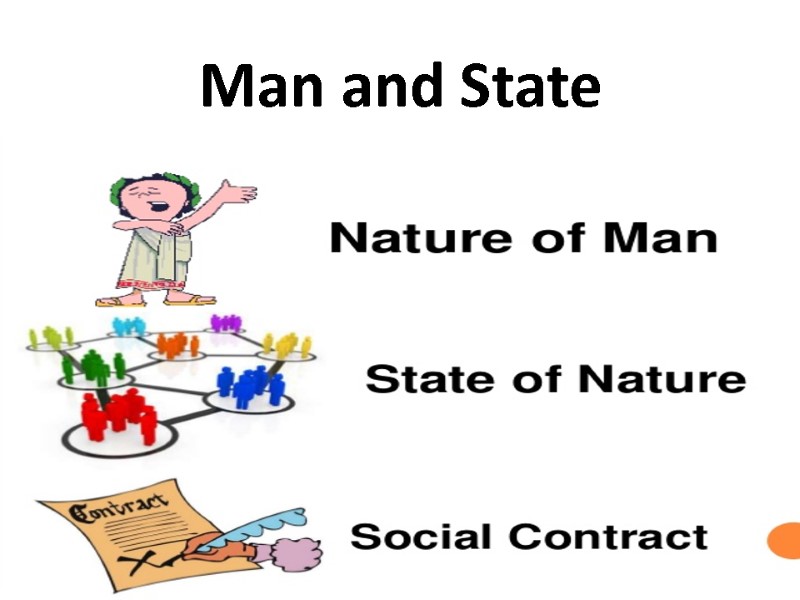
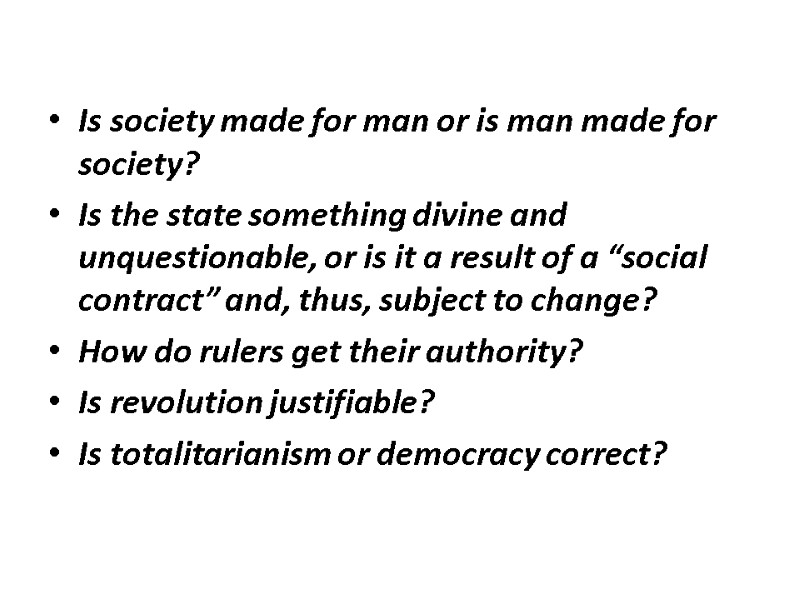
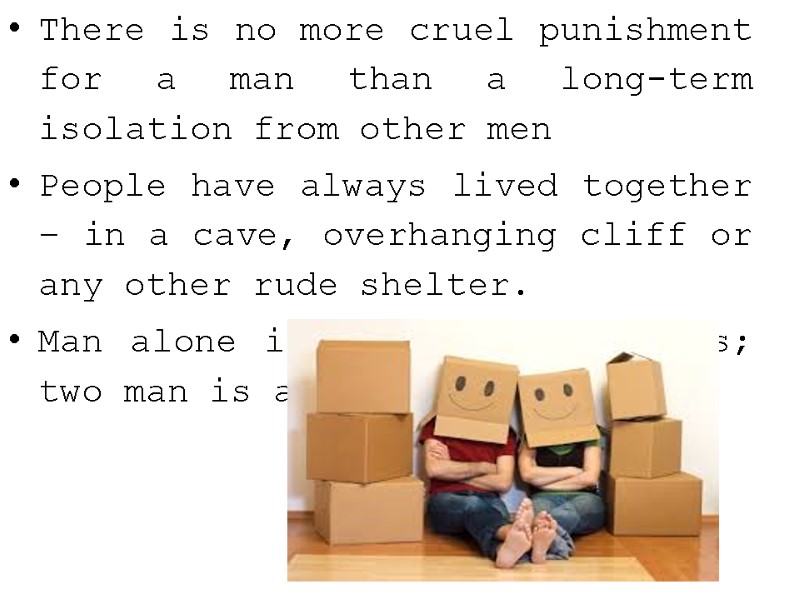
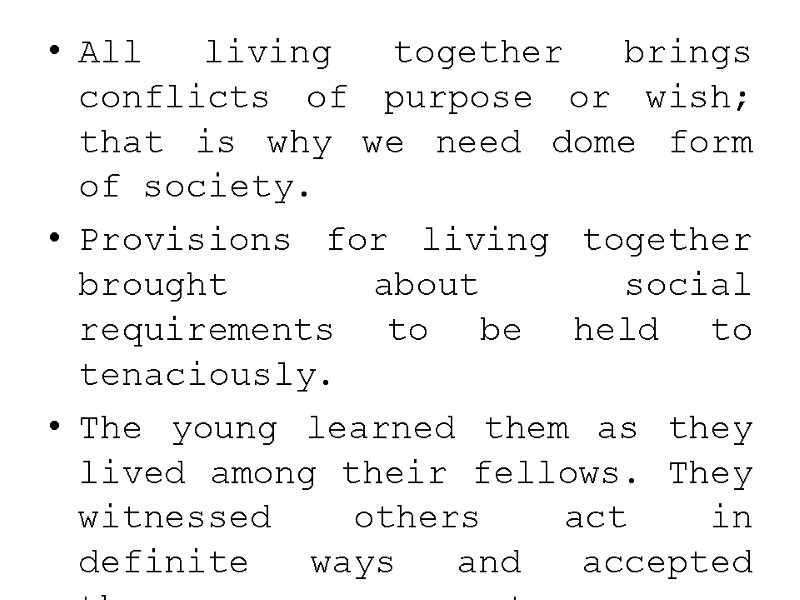
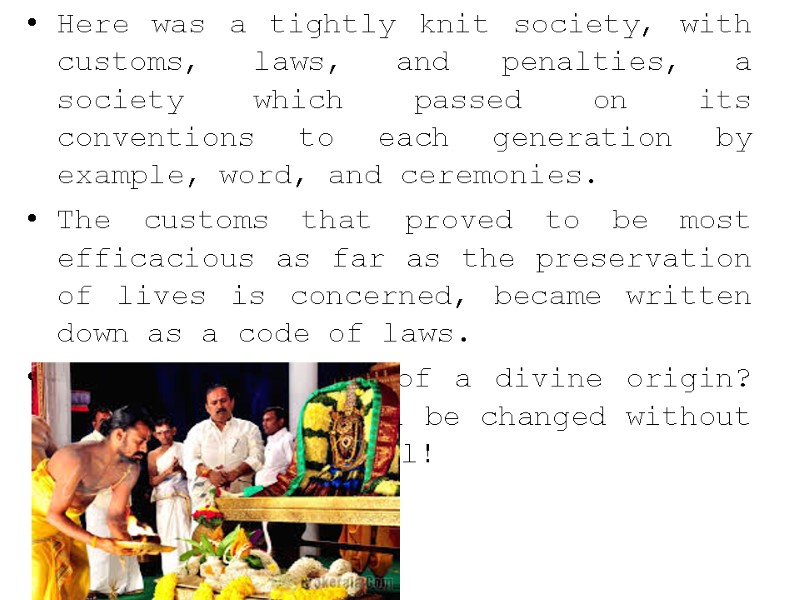
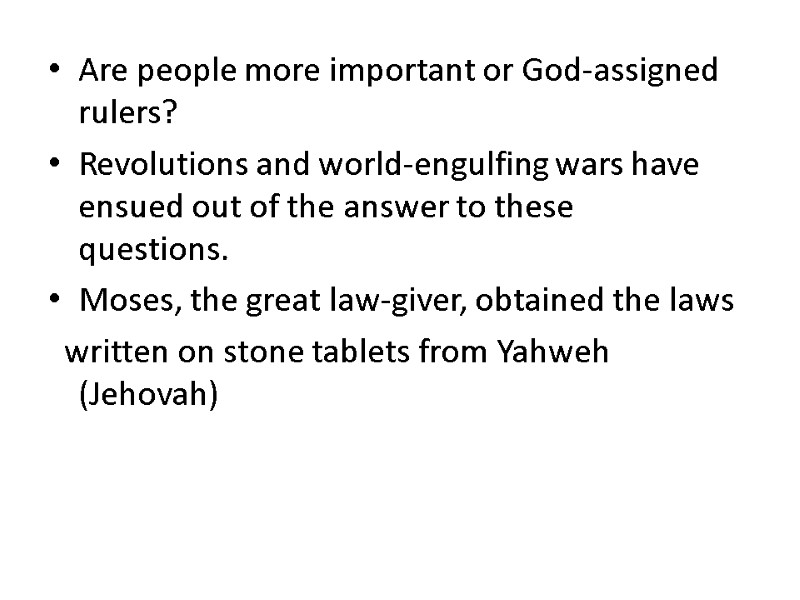

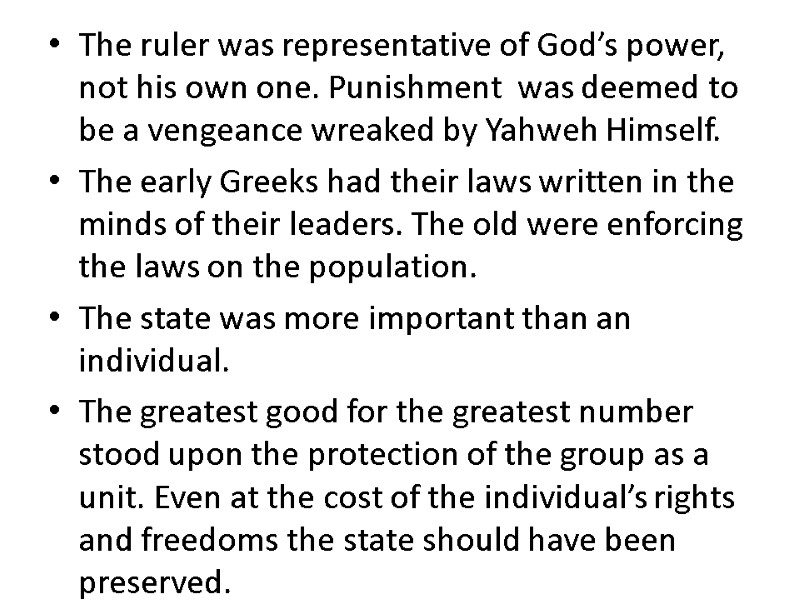
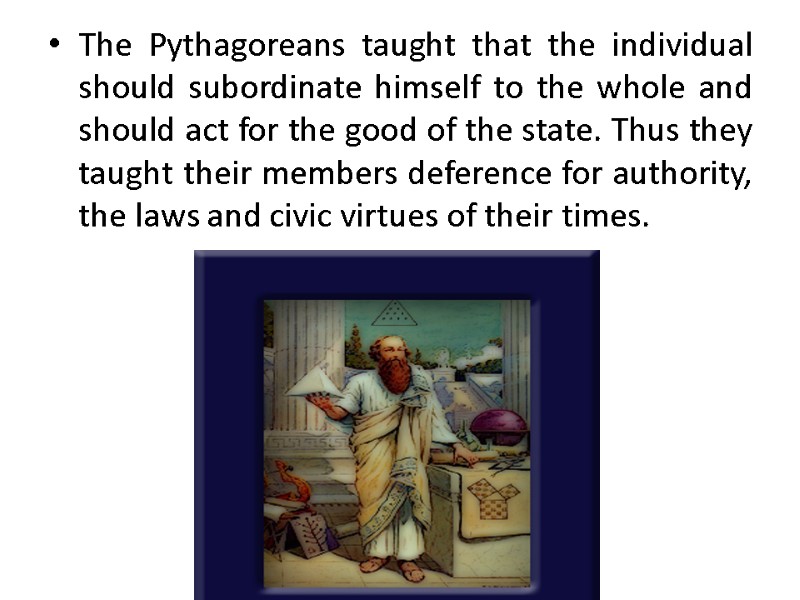
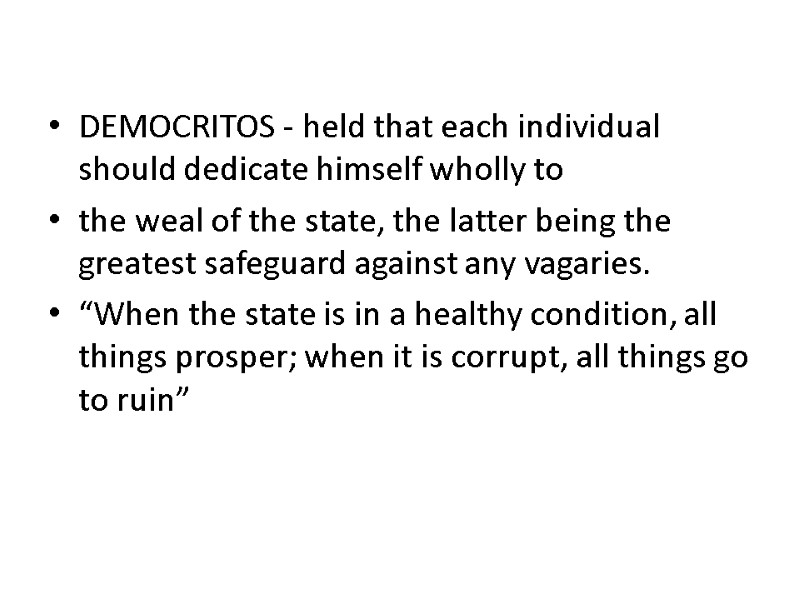
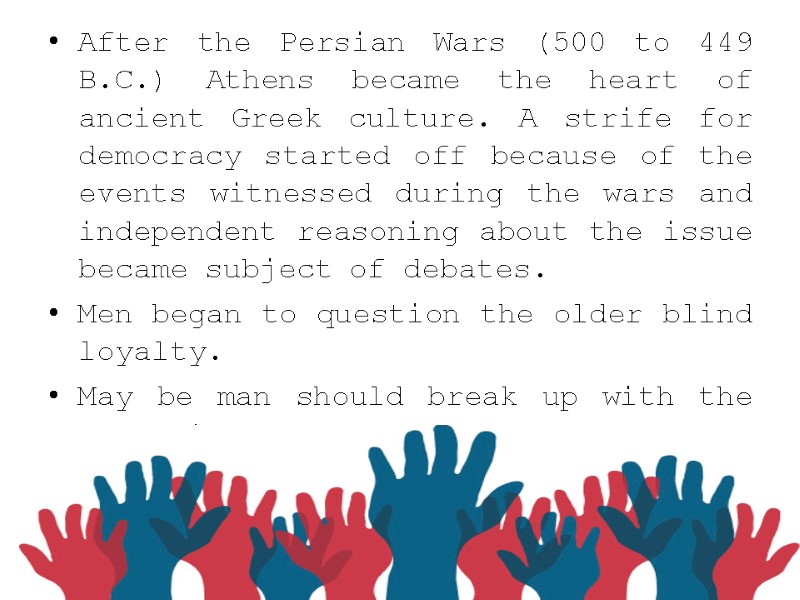
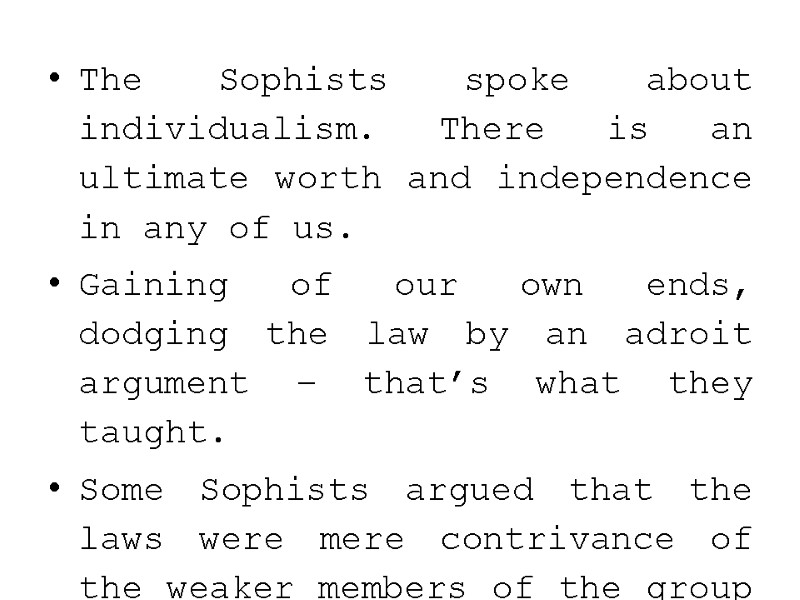
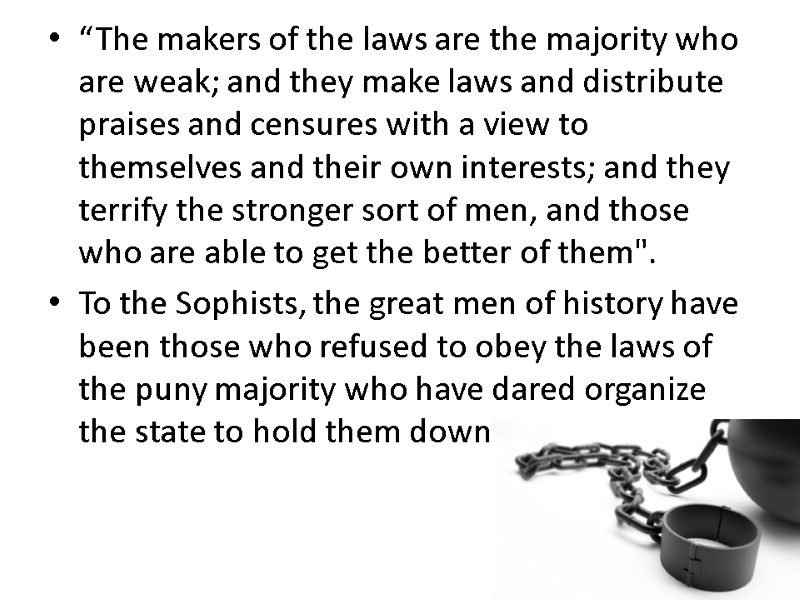
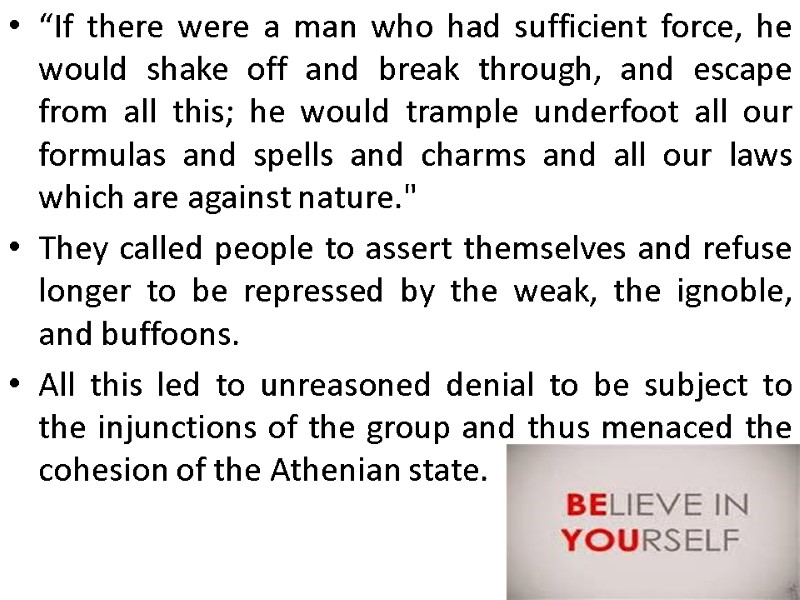
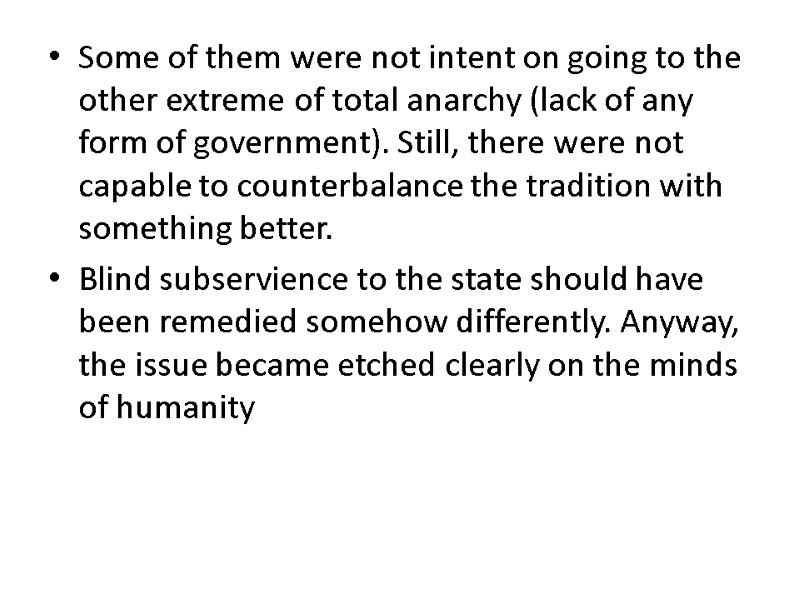
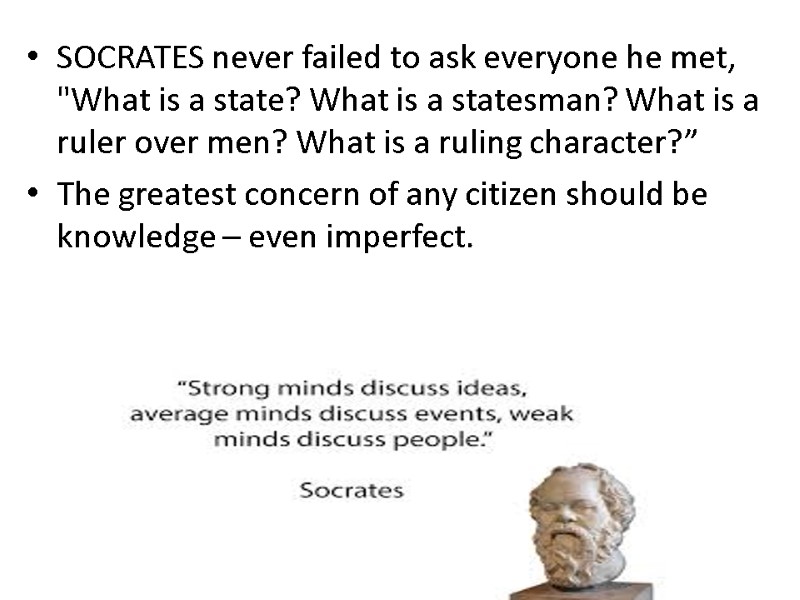
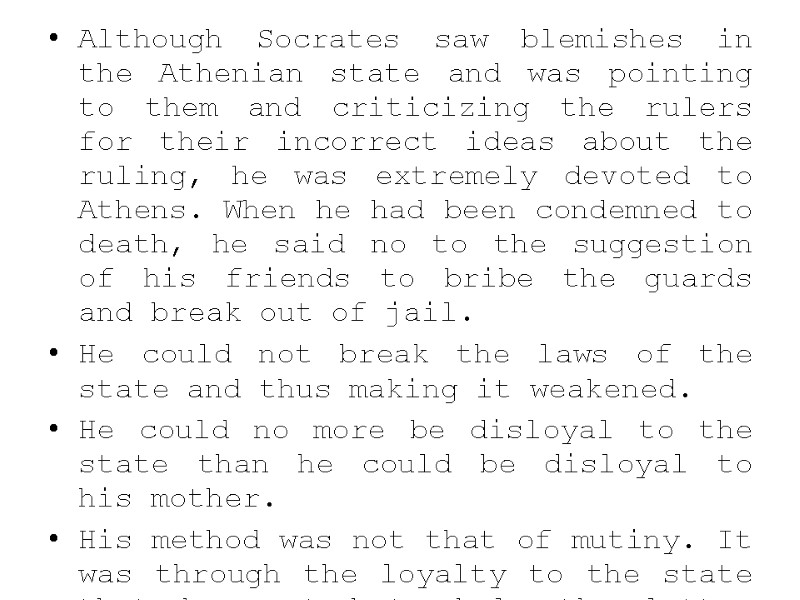
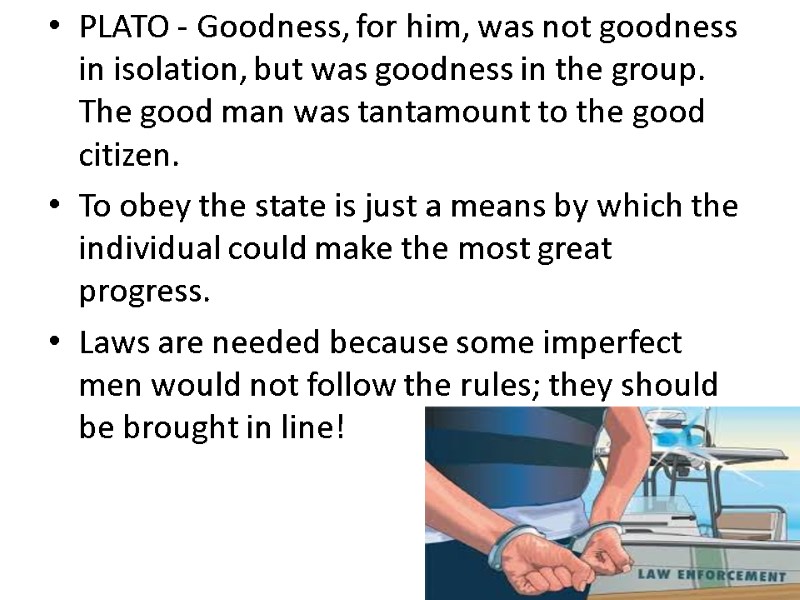
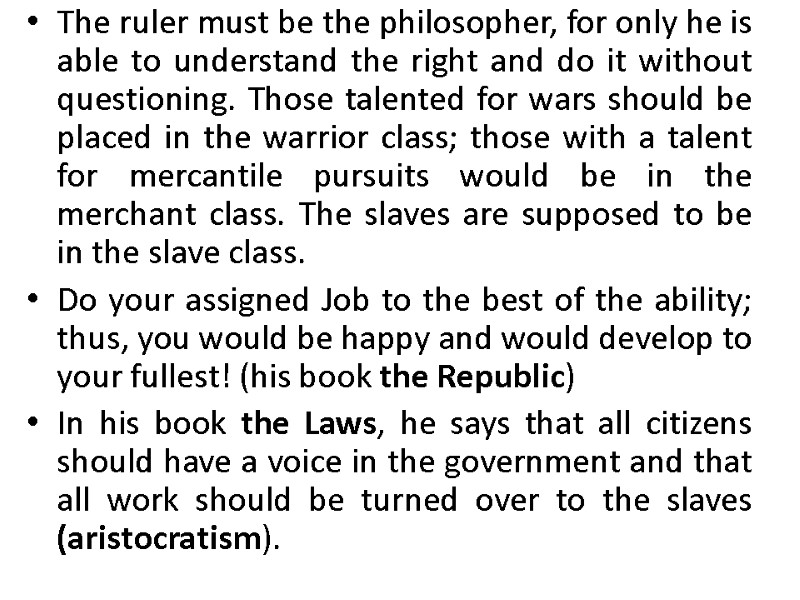
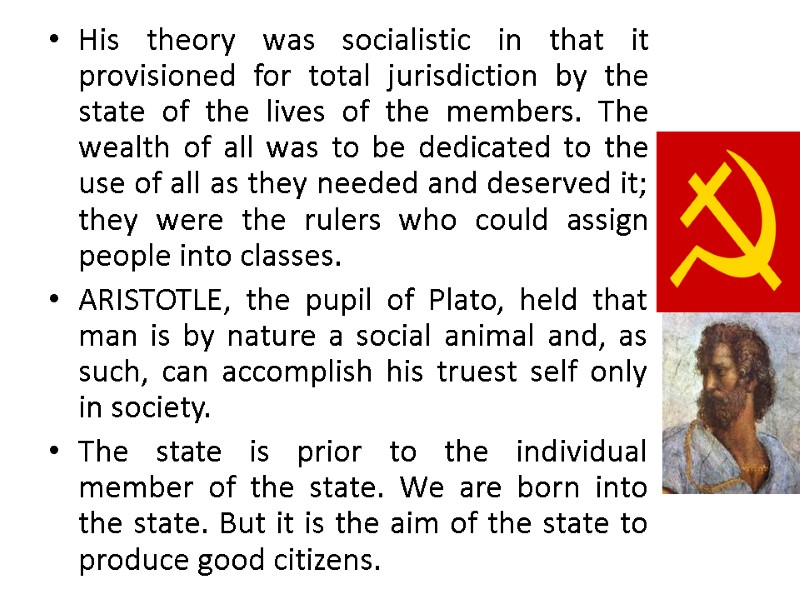
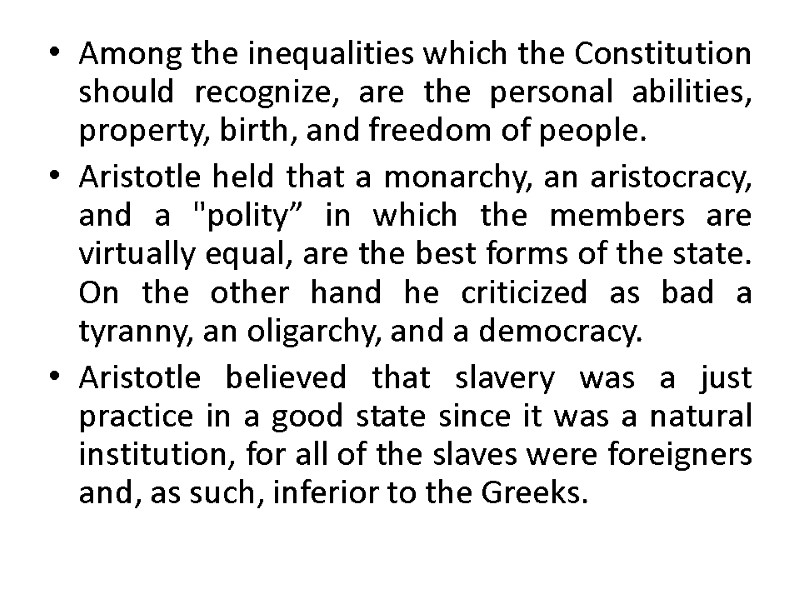
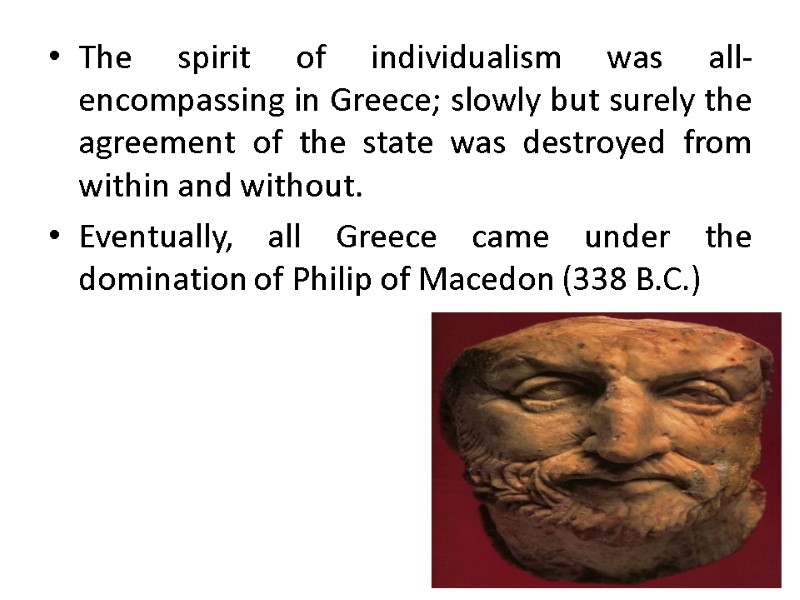
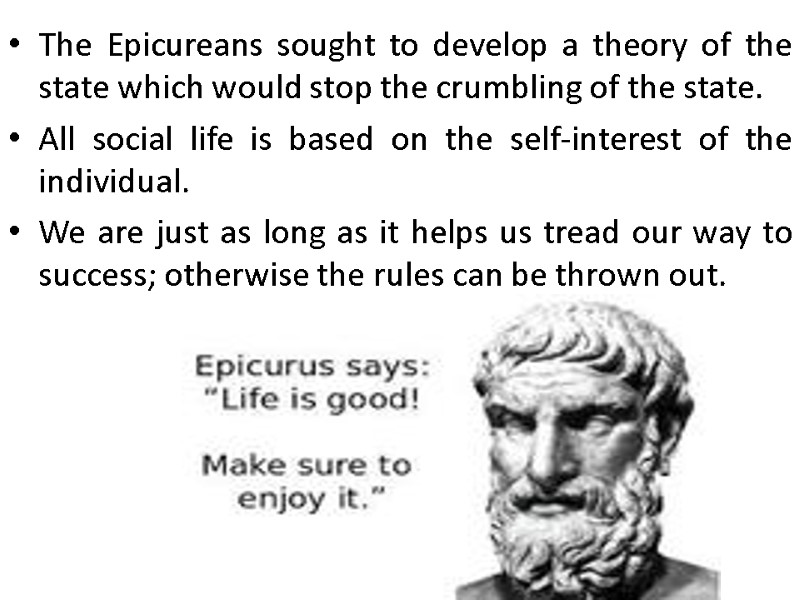
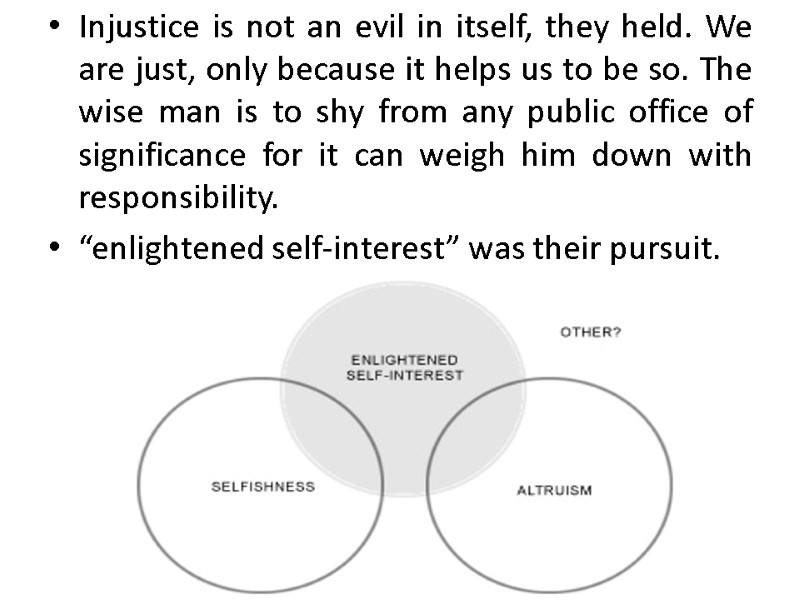
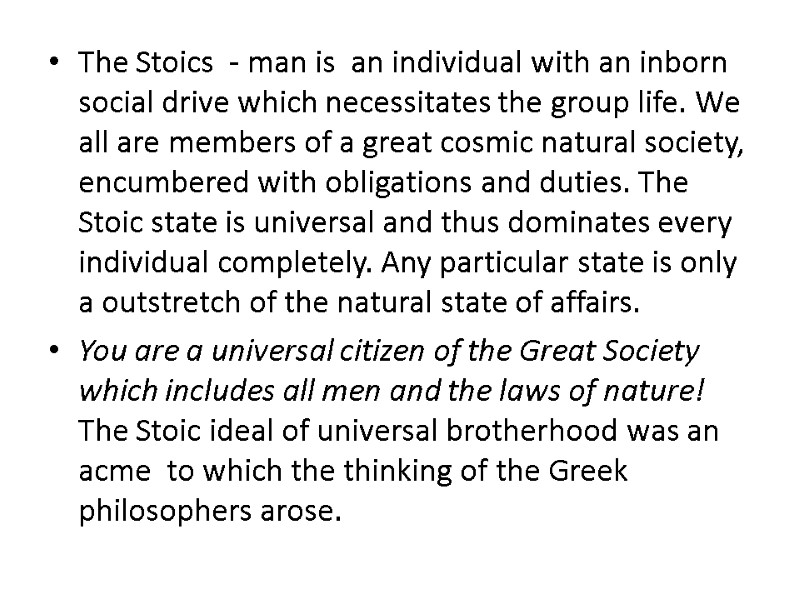
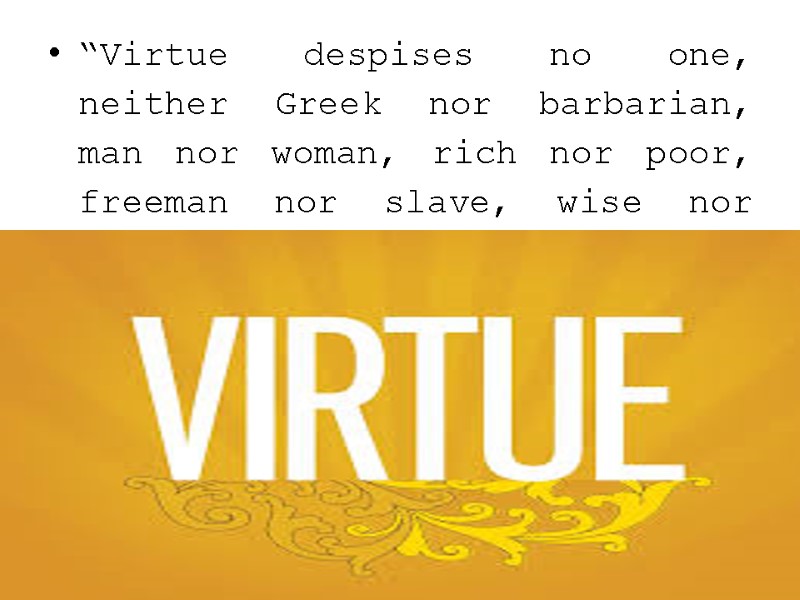
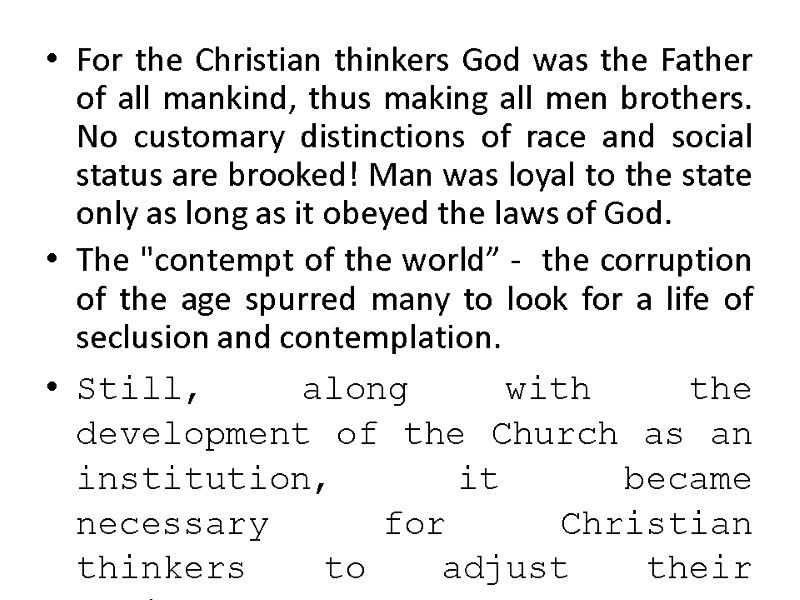
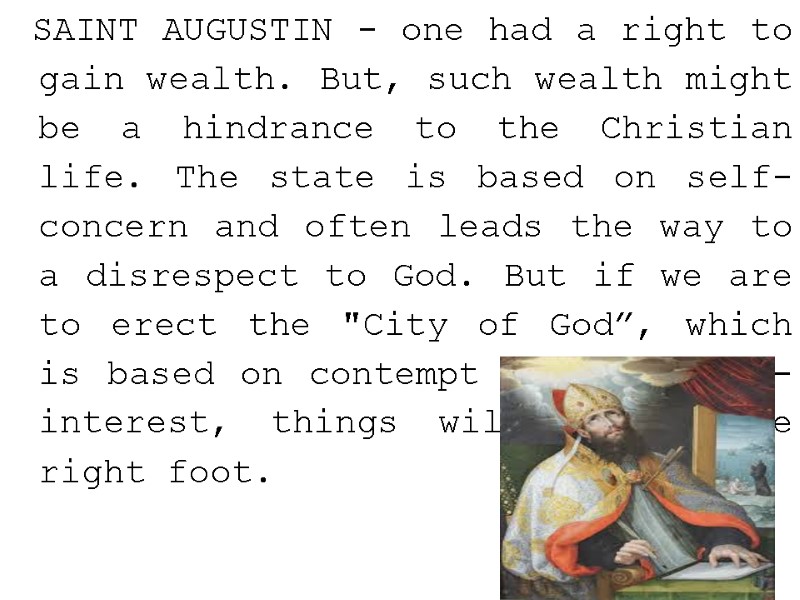
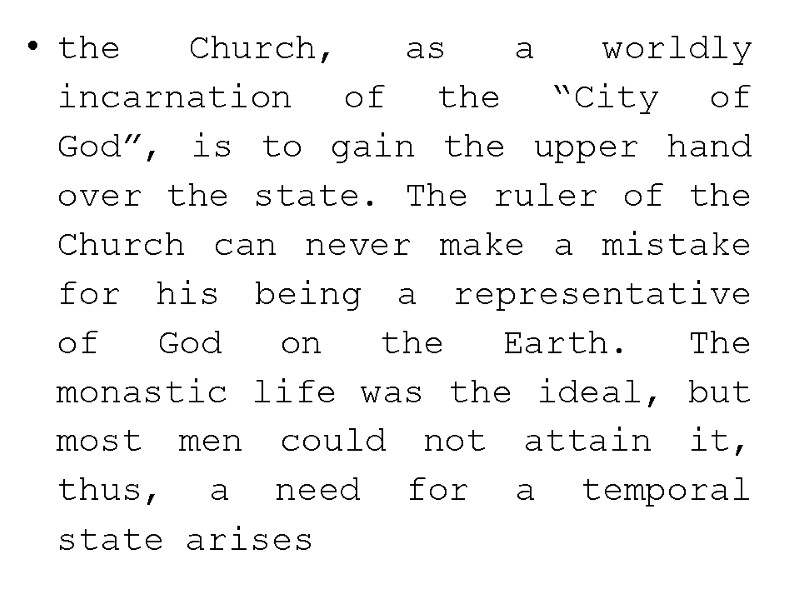
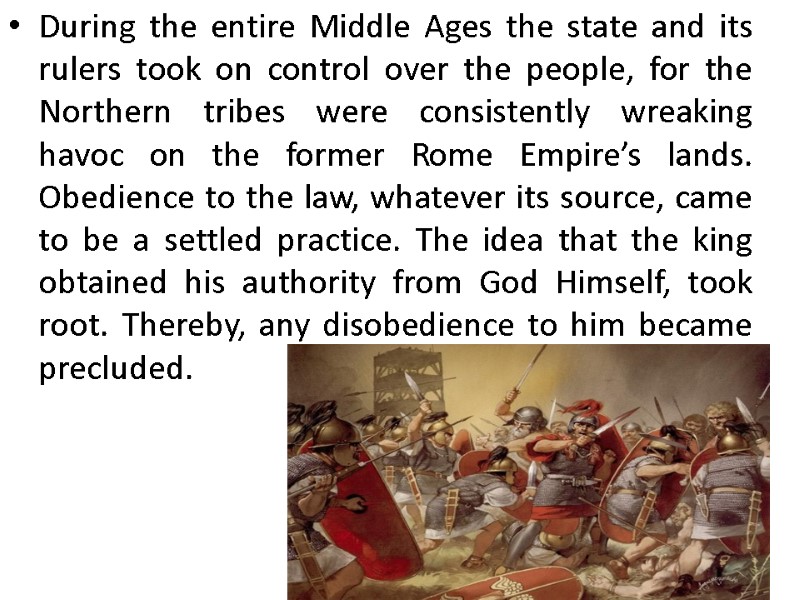
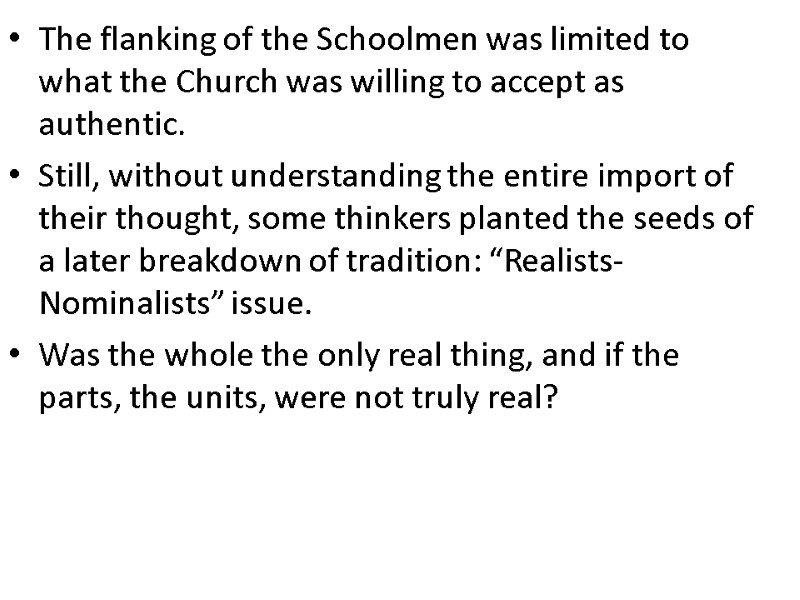
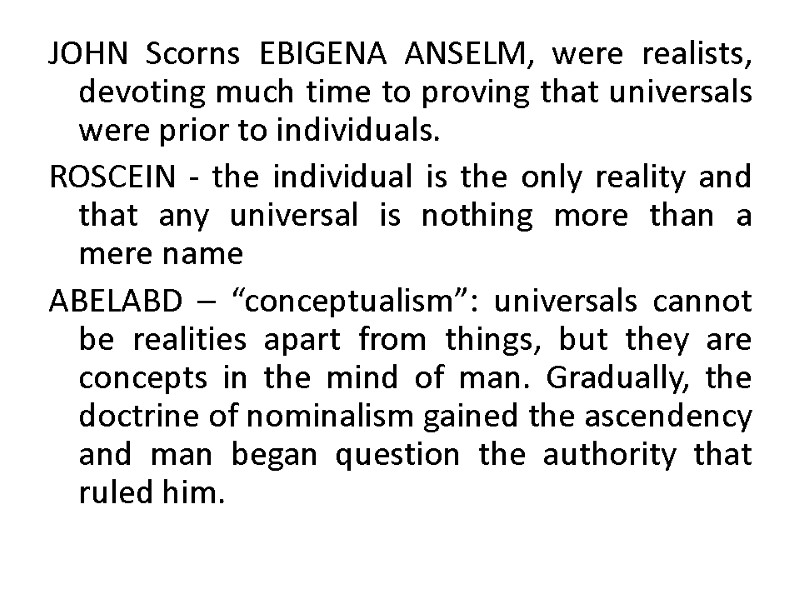
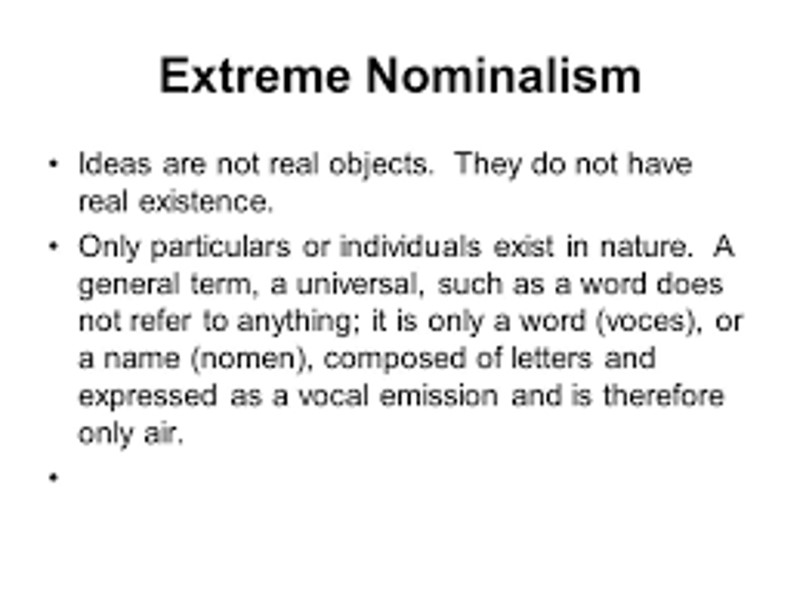
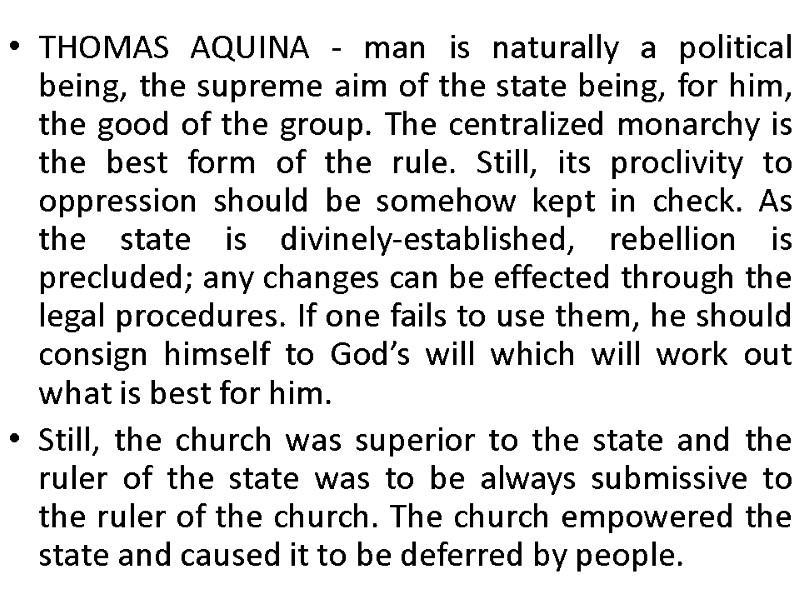
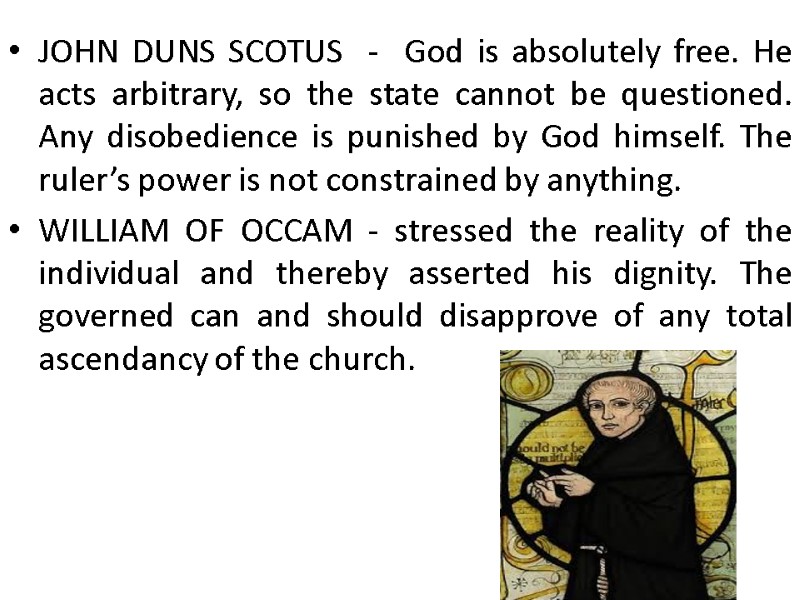
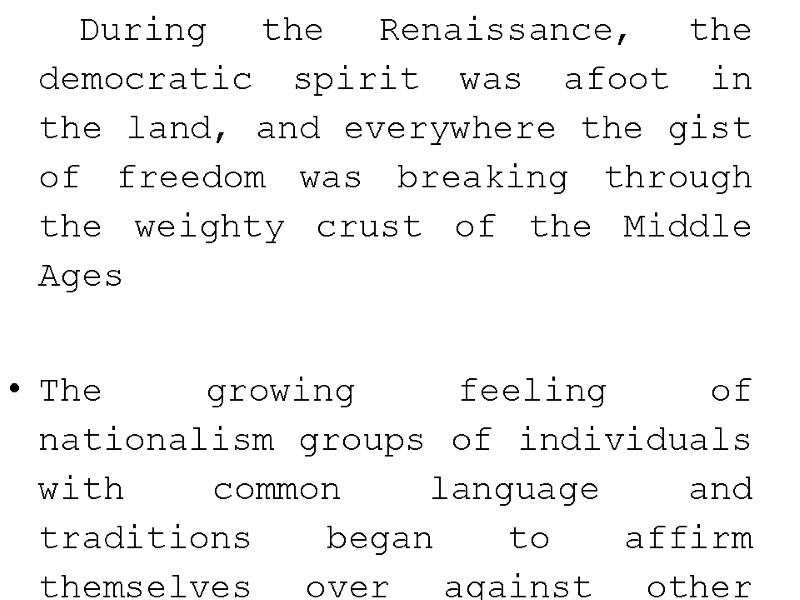
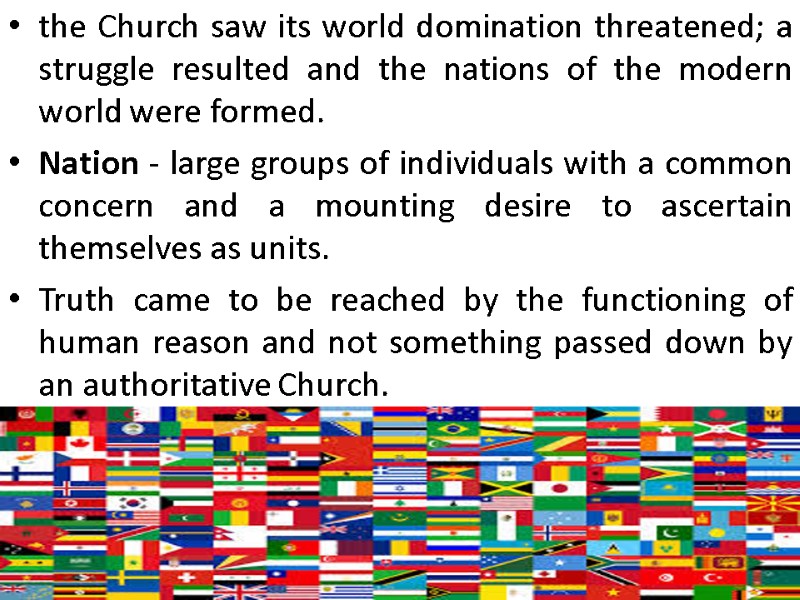
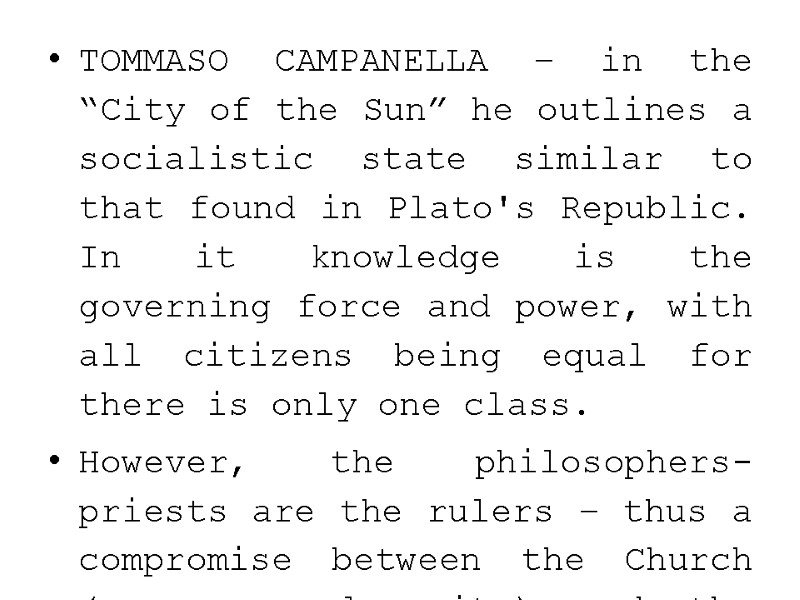
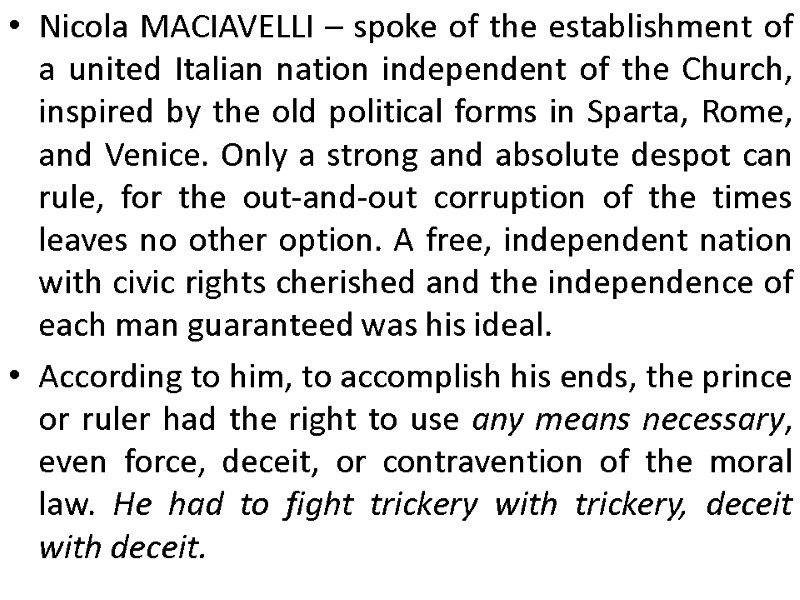
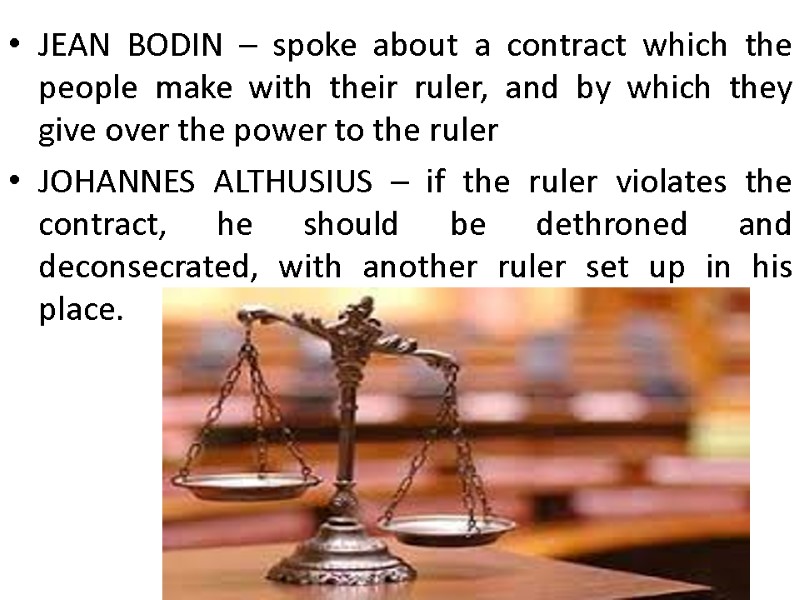
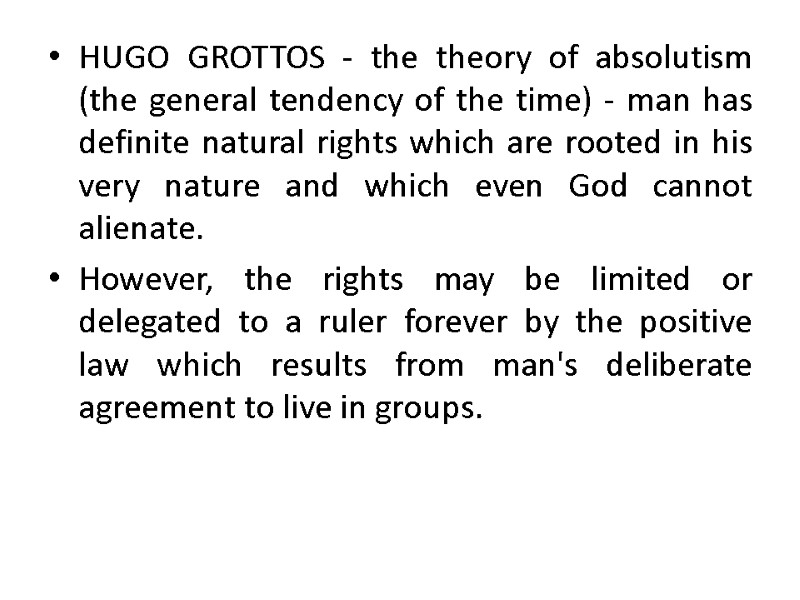
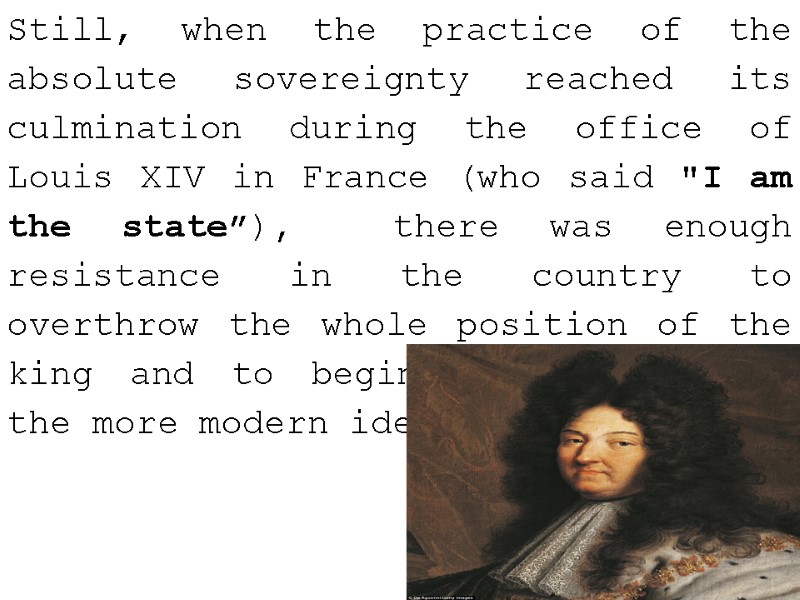
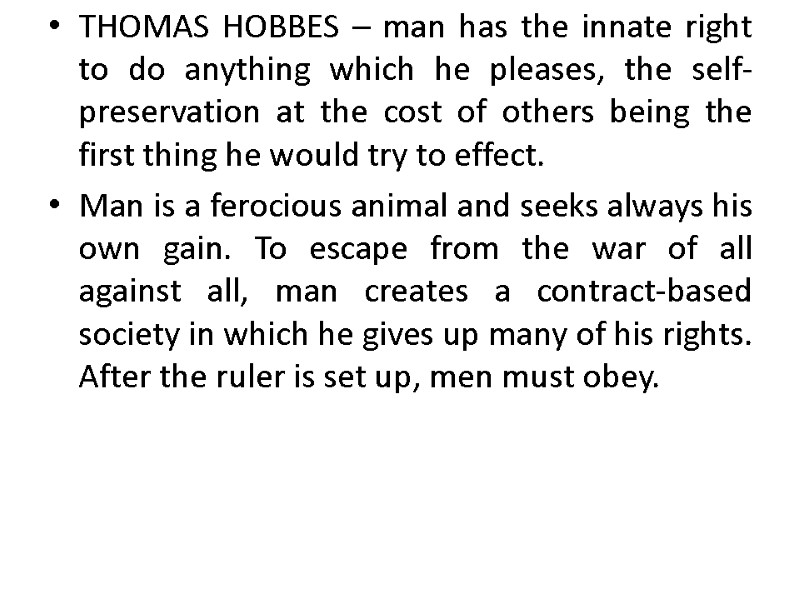
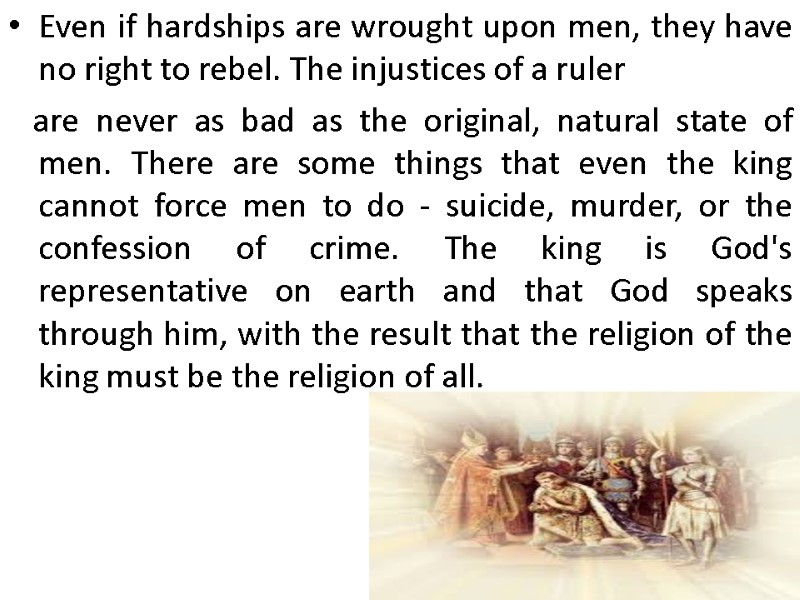
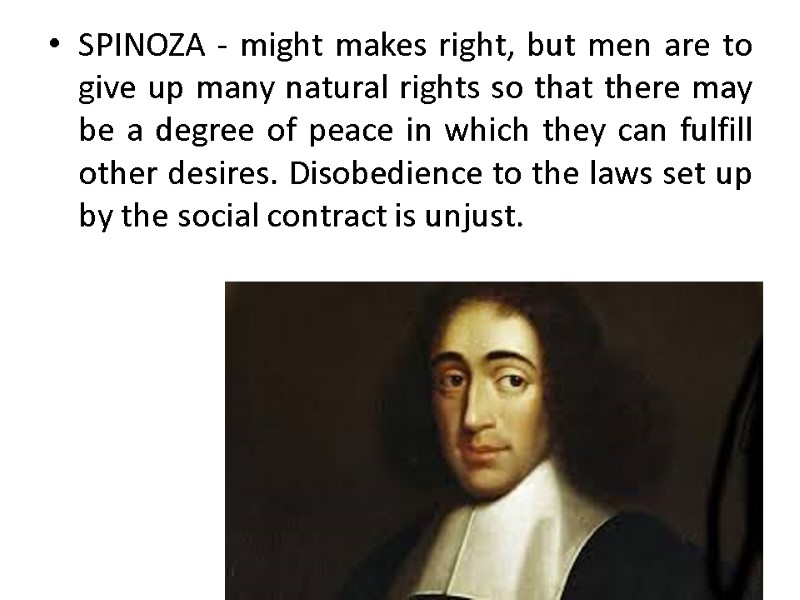
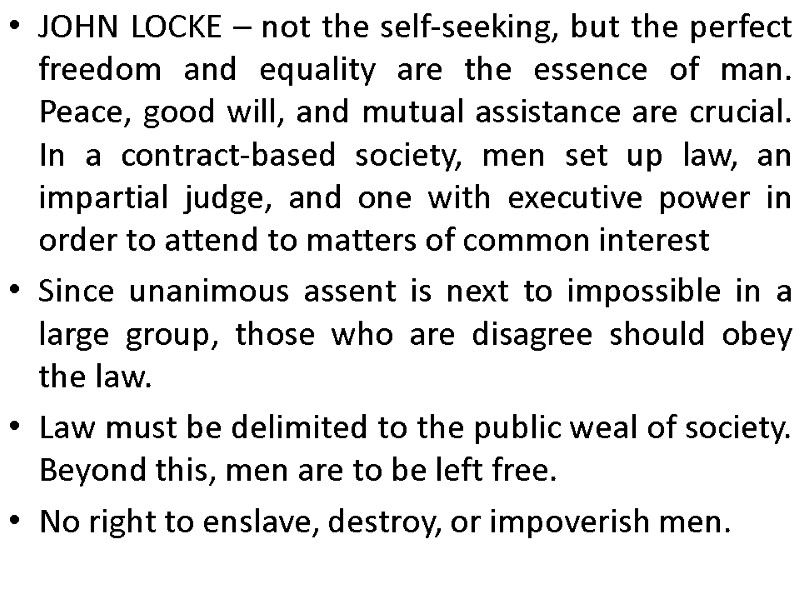
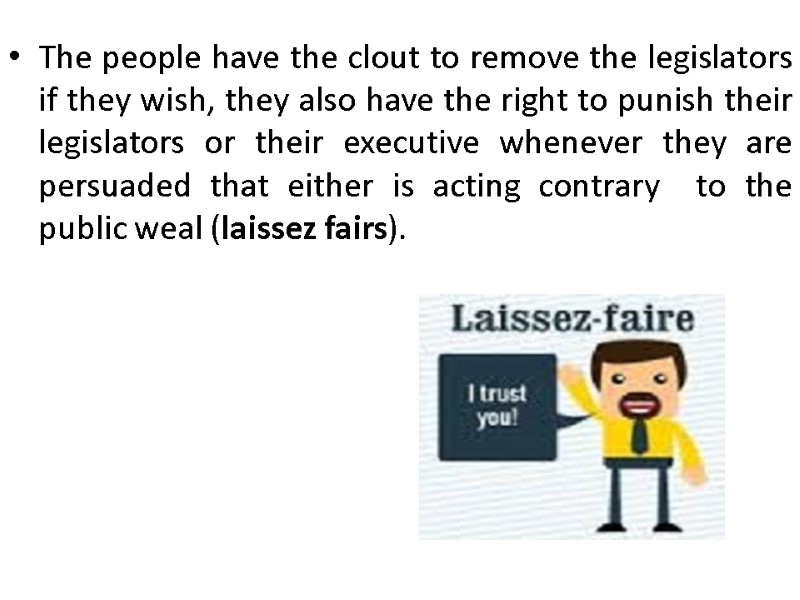
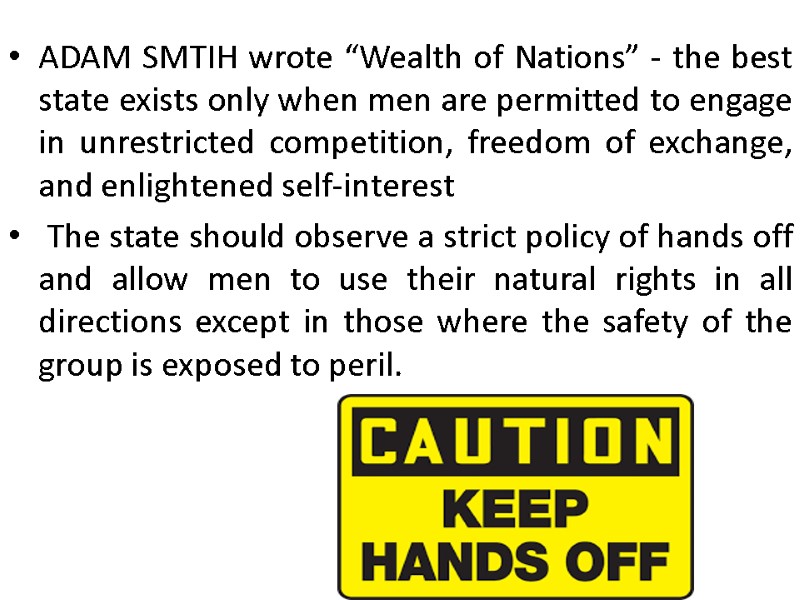
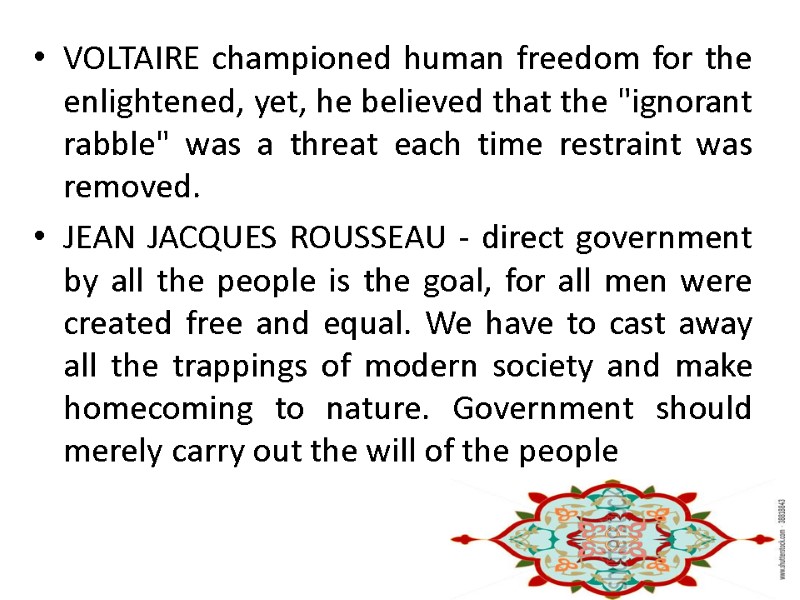
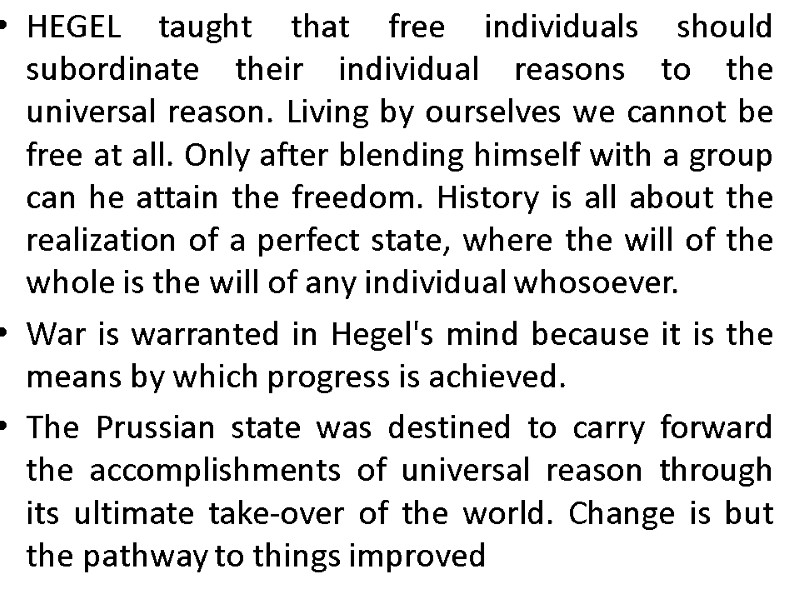
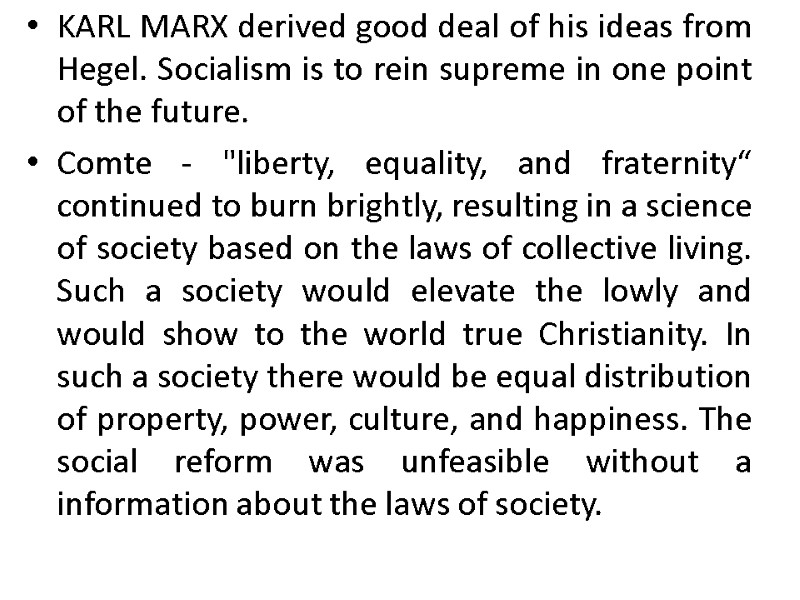
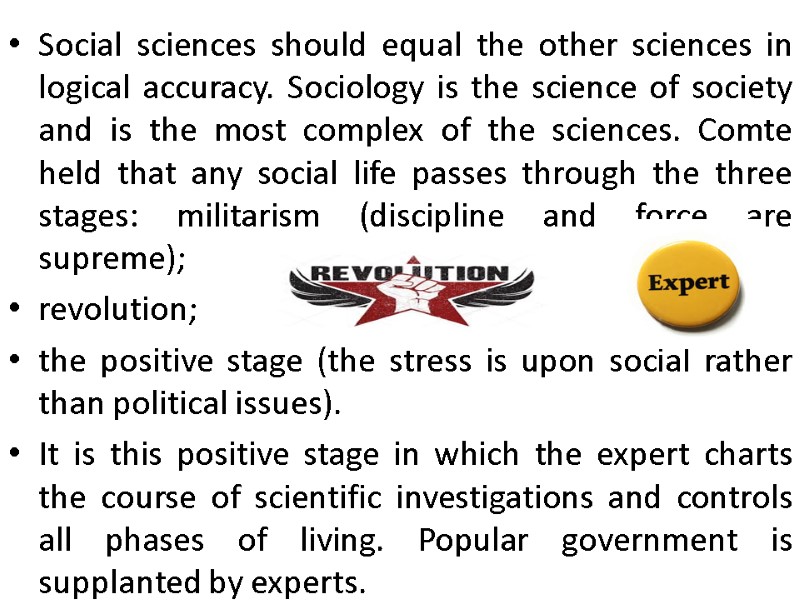
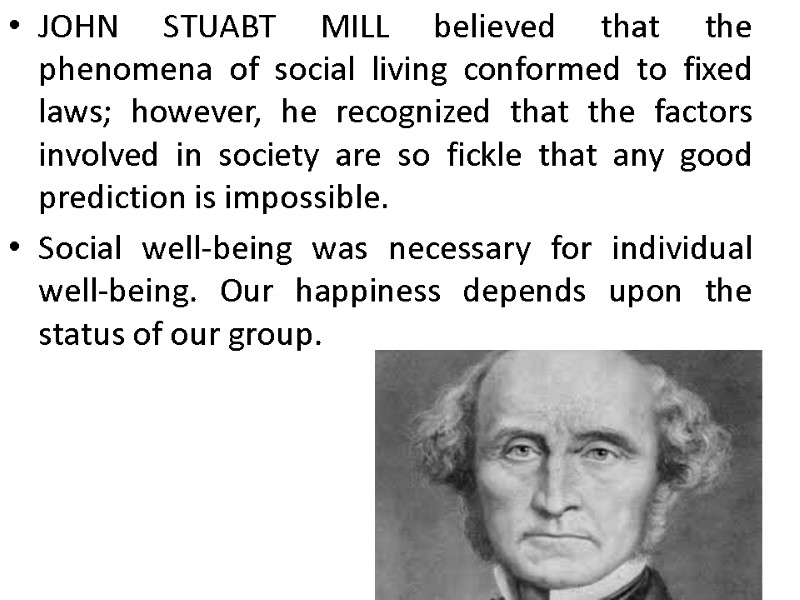
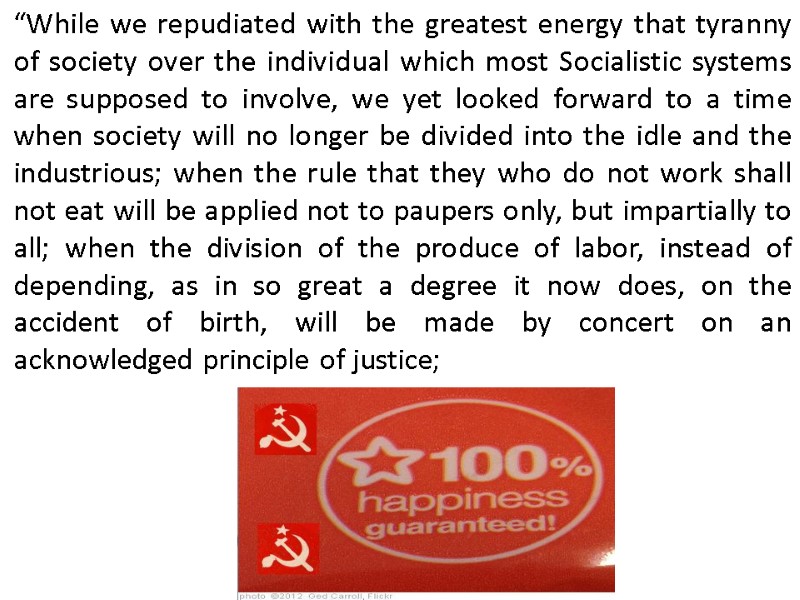
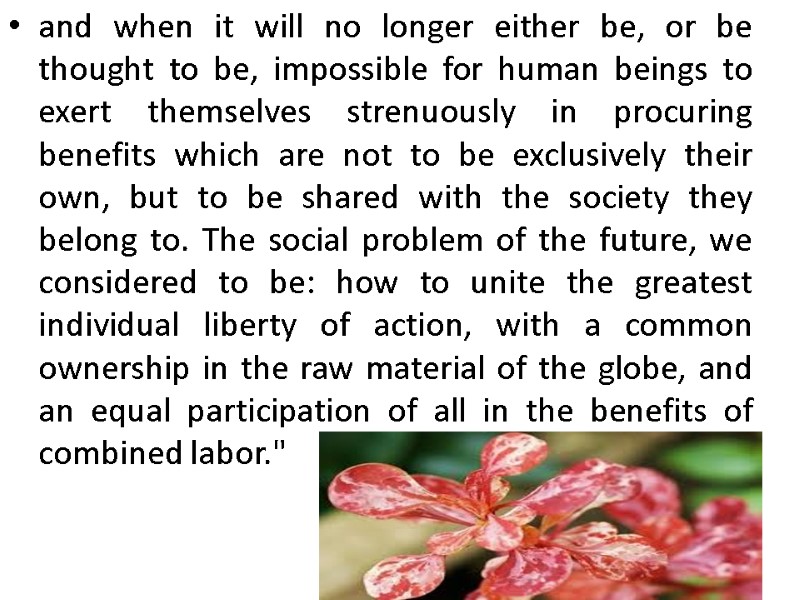
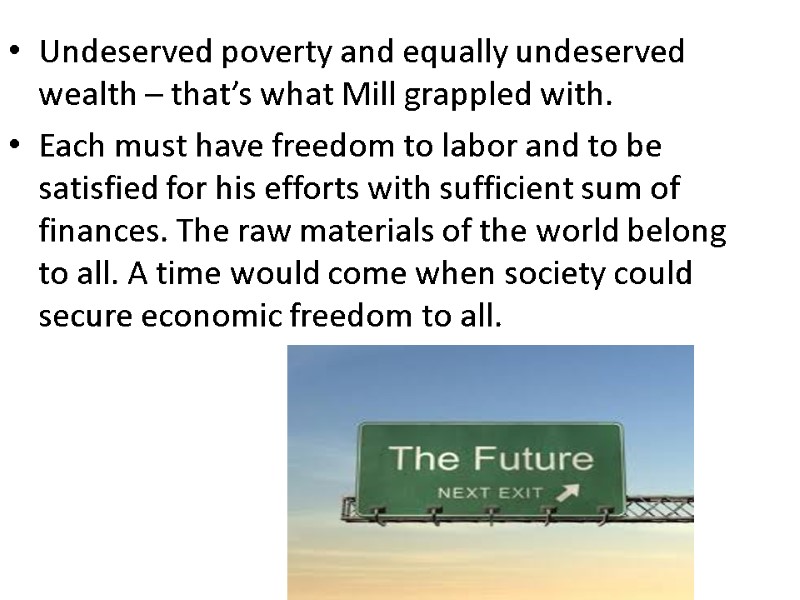
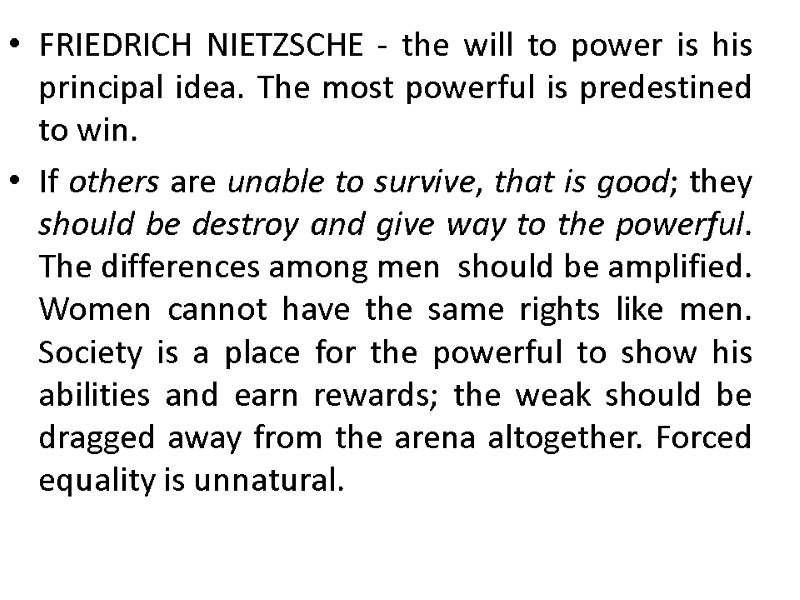
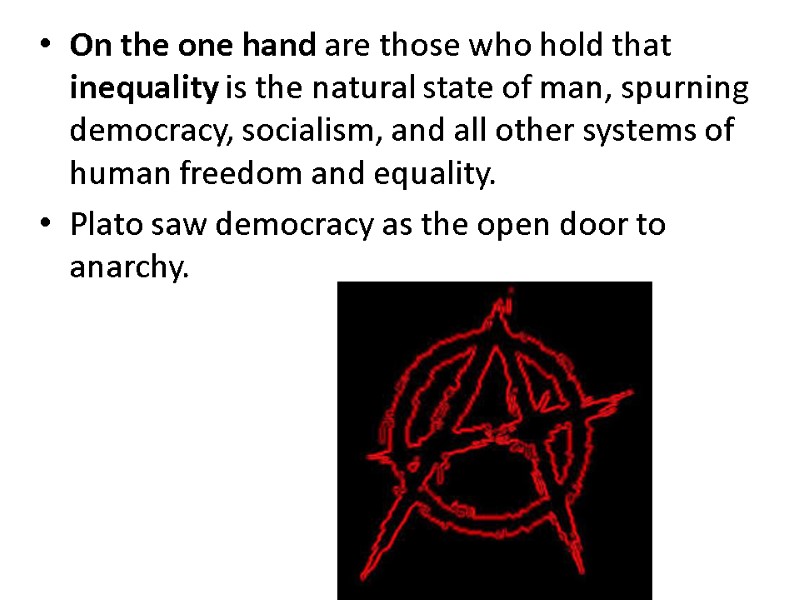
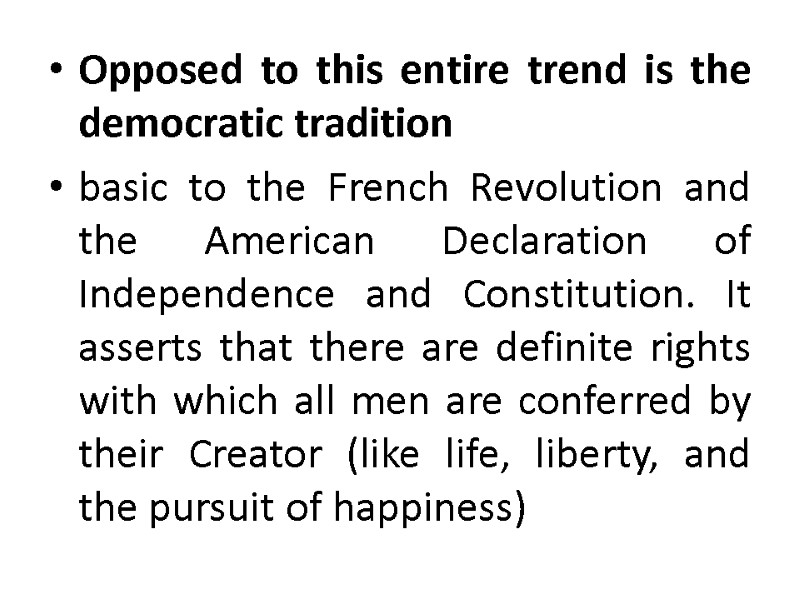
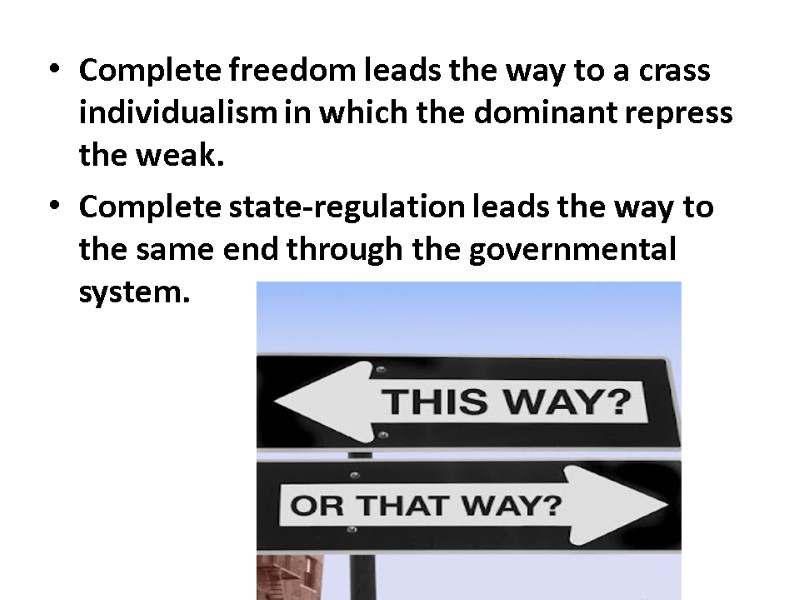
7398-lecture_8__-_state_and_man.ppt
- Количество слайдов: 60
 Man and State
Man and State
 Is society made for man or is man made for society? Is the state something divine and unquestionable, or is it a result of a “social contract” and, thus, subject to change? How do rulers get their authority? Is revolution justifiable? Is totalitarianism or democracy correct?
Is society made for man or is man made for society? Is the state something divine and unquestionable, or is it a result of a “social contract” and, thus, subject to change? How do rulers get their authority? Is revolution justifiable? Is totalitarianism or democracy correct?
 There is no more cruel punishment for a man than a long-term isolation from other men People have always lived together – in a cave, overhanging cliff or any other rude shelter. Man alone is exposed to enemies; two man is a power.
There is no more cruel punishment for a man than a long-term isolation from other men People have always lived together – in a cave, overhanging cliff or any other rude shelter. Man alone is exposed to enemies; two man is a power.
 All living together brings conflicts of purpose or wish; that is why we need dome form of society. Provisions for living together brought about social requirements to be held to tenaciously. The young learned them as they lived among their fellows. They witnessed others act in definite ways and accepted these ways as correct.
All living together brings conflicts of purpose or wish; that is why we need dome form of society. Provisions for living together brought about social requirements to be held to tenaciously. The young learned them as they lived among their fellows. They witnessed others act in definite ways and accepted these ways as correct.
 Here was a tightly knit society, with customs, laws, and penalties, a society which passed on its conventions to each generation by example, word, and ceremonies. The customs that proved to be most efficacious as far as the preservation of lives is concerned, became written down as a code of laws. Are these customs of a divine origin? If not, it can well be changed without us becoming at peril!
Here was a tightly knit society, with customs, laws, and penalties, a society which passed on its conventions to each generation by example, word, and ceremonies. The customs that proved to be most efficacious as far as the preservation of lives is concerned, became written down as a code of laws. Are these customs of a divine origin? If not, it can well be changed without us becoming at peril!
 Are people more important or God-assigned rulers? Revolutions and world-engulfing wars have ensued out of the answer to these questions. Moses, the great law-giver, obtained the laws written on stone tablets from Yahweh (Jehovah)
Are people more important or God-assigned rulers? Revolutions and world-engulfing wars have ensued out of the answer to these questions. Moses, the great law-giver, obtained the laws written on stone tablets from Yahweh (Jehovah)

 The ruler was representative of God’s power, not his own one. Punishment was deemed to be a vengeance wreaked by Yahweh Himself. The early Greeks had their laws written in the minds of their leaders. The old were enforcing the laws on the population. The state was more important than an individual. The greatest good for the greatest number stood upon the protection of the group as a unit. Even at the cost of the individual’s rights and freedoms the state should have been preserved.
The ruler was representative of God’s power, not his own one. Punishment was deemed to be a vengeance wreaked by Yahweh Himself. The early Greeks had their laws written in the minds of their leaders. The old were enforcing the laws on the population. The state was more important than an individual. The greatest good for the greatest number stood upon the protection of the group as a unit. Even at the cost of the individual’s rights and freedoms the state should have been preserved.
 The Pythagoreans taught that the individual should subordinate himself to the whole and should act for the good of the state. Thus they taught their members deference for authority, the laws and civic virtues of their times.
The Pythagoreans taught that the individual should subordinate himself to the whole and should act for the good of the state. Thus they taught their members deference for authority, the laws and civic virtues of their times.
 DEMOCRITOS - held that each individual should dedicate himself wholly to the weal of the state, the latter being the greatest safeguard against any vagaries. “When the state is in a healthy condition, all things prosper; when it is corrupt, all things go to ruin”
DEMOCRITOS - held that each individual should dedicate himself wholly to the weal of the state, the latter being the greatest safeguard against any vagaries. “When the state is in a healthy condition, all things prosper; when it is corrupt, all things go to ruin”
 After the Persian Wars (500 to 449 B.C.) Athens became the heart of ancient Greek culture. A strife for democracy started off because of the events witnessed during the wars and independent reasoning about the issue became subject of debates. Men began to question the older blind loyalty. May be man should break up with the authority of the group and hold himself free to face up to the group and criticize freely the older customs.
After the Persian Wars (500 to 449 B.C.) Athens became the heart of ancient Greek culture. A strife for democracy started off because of the events witnessed during the wars and independent reasoning about the issue became subject of debates. Men began to question the older blind loyalty. May be man should break up with the authority of the group and hold himself free to face up to the group and criticize freely the older customs.
 The Sophists spoke about individualism. There is an ultimate worth and independence in any of us. Gaining of our own ends, dodging the law by an adroit argument – that’s what they taught. Some Sophists argued that the laws were mere contrivance of the weaker members of the group to hold down the stronger.
The Sophists spoke about individualism. There is an ultimate worth and independence in any of us. Gaining of our own ends, dodging the law by an adroit argument – that’s what they taught. Some Sophists argued that the laws were mere contrivance of the weaker members of the group to hold down the stronger.
 “The makers of the laws are the majority who are weak; and they make laws and distribute praises and censures with a view to themselves and their own interests; and they terrify the stronger sort of men, and those who are able to get the better of them". To the Sophists, the great men of history have been those who refused to obey the laws of the puny majority who have dared organize the state to hold them down.
“The makers of the laws are the majority who are weak; and they make laws and distribute praises and censures with a view to themselves and their own interests; and they terrify the stronger sort of men, and those who are able to get the better of them". To the Sophists, the great men of history have been those who refused to obey the laws of the puny majority who have dared organize the state to hold them down.
 “If there were a man who had sufficient force, he would shake off and break through, and escape from all this; he would trample underfoot all our formulas and spells and charms and all our laws which are against nature." They called people to assert themselves and refuse longer to be repressed by the weak, the ignoble, and buffoons. All this led to unreasoned denial to be subject to the injunctions of the group and thus menaced the cohesion of the Athenian state.
“If there were a man who had sufficient force, he would shake off and break through, and escape from all this; he would trample underfoot all our formulas and spells and charms and all our laws which are against nature." They called people to assert themselves and refuse longer to be repressed by the weak, the ignoble, and buffoons. All this led to unreasoned denial to be subject to the injunctions of the group and thus menaced the cohesion of the Athenian state.
 Some of them were not intent on going to the other extreme of total anarchy (lack of any form of government). Still, there were not capable to counterbalance the tradition with something better. Blind subservience to the state should have been remedied somehow differently. Anyway, the issue became etched clearly on the minds of humanity
Some of them were not intent on going to the other extreme of total anarchy (lack of any form of government). Still, there were not capable to counterbalance the tradition with something better. Blind subservience to the state should have been remedied somehow differently. Anyway, the issue became etched clearly on the minds of humanity
 SOCRATES never failed to ask everyone he met, "What is a state? What is a statesman? What is a ruler over men? What is a ruling character?” The greatest concern of any citizen should be knowledge – even imperfect.
SOCRATES never failed to ask everyone he met, "What is a state? What is a statesman? What is a ruler over men? What is a ruling character?” The greatest concern of any citizen should be knowledge – even imperfect.
 Although Socrates saw blemishes in the Athenian state and was pointing to them and criticizing the rulers for their incorrect ideas about the ruling, he was extremely devoted to Athens. When he had been condemned to death, he said no to the suggestion of his friends to bribe the guards and break out of jail. He could not break the laws of the state and thus making it weakened. He could no more be disloyal to the state than he could be disloyal to his mother. His method was not that of mutiny. It was through the loyalty to the state that he wanted to help the latter correct its ways.
Although Socrates saw blemishes in the Athenian state and was pointing to them and criticizing the rulers for their incorrect ideas about the ruling, he was extremely devoted to Athens. When he had been condemned to death, he said no to the suggestion of his friends to bribe the guards and break out of jail. He could not break the laws of the state and thus making it weakened. He could no more be disloyal to the state than he could be disloyal to his mother. His method was not that of mutiny. It was through the loyalty to the state that he wanted to help the latter correct its ways.
 PLATO - Goodness, for him, was not goodness in isolation, but was goodness in the group. The good man was tantamount to the good citizen. To obey the state is just a means by which the individual could make the most great progress. Laws are needed because some imperfect men would not follow the rules; they should be brought in line!
PLATO - Goodness, for him, was not goodness in isolation, but was goodness in the group. The good man was tantamount to the good citizen. To obey the state is just a means by which the individual could make the most great progress. Laws are needed because some imperfect men would not follow the rules; they should be brought in line!
 The ruler must be the philosopher, for only he is able to understand the right and do it without questioning. Those talented for wars should be placed in the warrior class; those with a talent for mercantile pursuits would be in the merchant class. The slaves are supposed to be in the slave class. Do your assigned Job to the best of the ability; thus, you would be happy and would develop to your fullest! (his book the Republic) In his book the Laws, he says that all citizens should have a voice in the government and that all work should be turned over to the slaves (aristocratism).
The ruler must be the philosopher, for only he is able to understand the right and do it without questioning. Those talented for wars should be placed in the warrior class; those with a talent for mercantile pursuits would be in the merchant class. The slaves are supposed to be in the slave class. Do your assigned Job to the best of the ability; thus, you would be happy and would develop to your fullest! (his book the Republic) In his book the Laws, he says that all citizens should have a voice in the government and that all work should be turned over to the slaves (aristocratism).
 His theory was socialistic in that it provisioned for total jurisdiction by the state of the lives of the members. The wealth of all was to be dedicated to the use of all as they needed and deserved it; they were the rulers who could assign people into classes. ARISTOTLE, the pupil of Plato, held that man is by nature a social animal and, as such, can accomplish his truest self only in society. The state is prior to the individual member of the state. We are born into the state. But it is the aim of the state to produce good citizens.
His theory was socialistic in that it provisioned for total jurisdiction by the state of the lives of the members. The wealth of all was to be dedicated to the use of all as they needed and deserved it; they were the rulers who could assign people into classes. ARISTOTLE, the pupil of Plato, held that man is by nature a social animal and, as such, can accomplish his truest self only in society. The state is prior to the individual member of the state. We are born into the state. But it is the aim of the state to produce good citizens.
 Among the inequalities which the Constitution should recognize, are the personal abilities, property, birth, and freedom of people. Aristotle held that a monarchy, an aristocracy, and a "polity” in which the members are virtually equal, are the best forms of the state. On the other hand he criticized as bad a tyranny, an oligarchy, and a democracy. Aristotle believed that slavery was a just practice in a good state since it was a natural institution, for all of the slaves were foreigners and, as such, inferior to the Greeks.
Among the inequalities which the Constitution should recognize, are the personal abilities, property, birth, and freedom of people. Aristotle held that a monarchy, an aristocracy, and a "polity” in which the members are virtually equal, are the best forms of the state. On the other hand he criticized as bad a tyranny, an oligarchy, and a democracy. Aristotle believed that slavery was a just practice in a good state since it was a natural institution, for all of the slaves were foreigners and, as such, inferior to the Greeks.
 The spirit of individualism was all-encompassing in Greece; slowly but surely the agreement of the state was destroyed from within and without. Eventually, all Greece came under the domination of Philip of Macedon (338 B.C.)
The spirit of individualism was all-encompassing in Greece; slowly but surely the agreement of the state was destroyed from within and without. Eventually, all Greece came under the domination of Philip of Macedon (338 B.C.)
 The Epicureans sought to develop a theory of the state which would stop the crumbling of the state. All social life is based on the self-interest of the individual. We are just as long as it helps us tread our way to success; otherwise the rules can be thrown out.
The Epicureans sought to develop a theory of the state which would stop the crumbling of the state. All social life is based on the self-interest of the individual. We are just as long as it helps us tread our way to success; otherwise the rules can be thrown out.
 Injustice is not an evil in itself, they held. We are just, only because it helps us to be so. The wise man is to shy from any public office of significance for it can weigh him down with responsibility. “enlightened self-interest” was their pursuit.
Injustice is not an evil in itself, they held. We are just, only because it helps us to be so. The wise man is to shy from any public office of significance for it can weigh him down with responsibility. “enlightened self-interest” was their pursuit.
 The Stoics - man is an individual with an inborn social drive which necessitates the group life. We all are members of a great cosmic natural society, encumbered with obligations and duties. The Stoic state is universal and thus dominates every individual completely. Any particular state is only a outstretch of the natural state of affairs. You are a universal citizen of the Great Society which includes all men and the laws of nature! The Stoic ideal of universal brotherhood was an acme to which the thinking of the Greek philosophers arose.
The Stoics - man is an individual with an inborn social drive which necessitates the group life. We all are members of a great cosmic natural society, encumbered with obligations and duties. The Stoic state is universal and thus dominates every individual completely. Any particular state is only a outstretch of the natural state of affairs. You are a universal citizen of the Great Society which includes all men and the laws of nature! The Stoic ideal of universal brotherhood was an acme to which the thinking of the Greek philosophers arose.
 “Virtue despises no one, neither Greek nor barbarian, man nor woman, rich nor poor, freeman nor slave, wise nor ignorant, whole nor sick”.
“Virtue despises no one, neither Greek nor barbarian, man nor woman, rich nor poor, freeman nor slave, wise nor ignorant, whole nor sick”.
 For the Christian thinkers God was the Father of all mankind, thus making all men brothers. No customary distinctions of race and social status are brooked! Man was loyal to the state only as long as it obeyed the laws of God. The "contempt of the world” - the corruption of the age spurred many to look for a life of seclusion and contemplation. Still, along with the development of the Church as an institution, it became necessary for Christian thinkers to adjust their notions
For the Christian thinkers God was the Father of all mankind, thus making all men brothers. No customary distinctions of race and social status are brooked! Man was loyal to the state only as long as it obeyed the laws of God. The "contempt of the world” - the corruption of the age spurred many to look for a life of seclusion and contemplation. Still, along with the development of the Church as an institution, it became necessary for Christian thinkers to adjust their notions
 SAINT AUGUSTIN - one had a right to gain wealth. But, such wealth might be a hindrance to the Christian life. The state is based on self-concern and often leads the way to a disrespect to God. But if we are to erect the "City of God”, which is based on contempt for the self-interest, things will be on the right foot.
SAINT AUGUSTIN - one had a right to gain wealth. But, such wealth might be a hindrance to the Christian life. The state is based on self-concern and often leads the way to a disrespect to God. But if we are to erect the "City of God”, which is based on contempt for the self-interest, things will be on the right foot.
 the Church, as a worldly incarnation of the “City of God”, is to gain the upper hand over the state. The ruler of the Church can never make a mistake for his being a representative of God on the Earth. The monastic life was the ideal, but most men could not attain it, thus, a need for a temporal state arises
the Church, as a worldly incarnation of the “City of God”, is to gain the upper hand over the state. The ruler of the Church can never make a mistake for his being a representative of God on the Earth. The monastic life was the ideal, but most men could not attain it, thus, a need for a temporal state arises
 During the entire Middle Ages the state and its rulers took on control over the people, for the Northern tribes were consistently wreaking havoc on the former Rome Empire’s lands. Obedience to the law, whatever its source, came to be a settled practice. The idea that the king obtained his authority from God Himself, took root. Thereby, any disobedience to him became precluded.
During the entire Middle Ages the state and its rulers took on control over the people, for the Northern tribes were consistently wreaking havoc on the former Rome Empire’s lands. Obedience to the law, whatever its source, came to be a settled practice. The idea that the king obtained his authority from God Himself, took root. Thereby, any disobedience to him became precluded.
 The flanking of the Schoolmen was limited to what the Church was willing to accept as authentic. Still, without understanding the entire import of their thought, some thinkers planted the seeds of a later breakdown of tradition: “Realists-Nominalists” issue. Was the whole the only real thing, and if the parts, the units, were not truly real?
The flanking of the Schoolmen was limited to what the Church was willing to accept as authentic. Still, without understanding the entire import of their thought, some thinkers planted the seeds of a later breakdown of tradition: “Realists-Nominalists” issue. Was the whole the only real thing, and if the parts, the units, were not truly real?
 JOHN Scorns EBIGENA ANSELM, were realists, devoting much time to proving that universals were prior to individuals. ROSCEIN - the individual is the only reality and that any universal is nothing more than a mere name ABELABD – “conceptualism”: universals cannot be realities apart from things, but they are concepts in the mind of man. Gradually, the doctrine of nominalism gained the ascendency and man began question the authority that ruled him.
JOHN Scorns EBIGENA ANSELM, were realists, devoting much time to proving that universals were prior to individuals. ROSCEIN - the individual is the only reality and that any universal is nothing more than a mere name ABELABD – “conceptualism”: universals cannot be realities apart from things, but they are concepts in the mind of man. Gradually, the doctrine of nominalism gained the ascendency and man began question the authority that ruled him.

 THOMAS AQUINA - man is naturally a political being, the supreme aim of the state being, for him, the good of the group. The centralized monarchy is the best form of the rule. Still, its proclivity to oppression should be somehow kept in check. As the state is divinely-established, rebellion is precluded; any changes can be effected through the legal procedures. If one fails to use them, he should consign himself to God’s will which will work out what is best for him. Still, the church was superior to the state and the ruler of the state was to be always submissive to the ruler of the church. The church empowered the state and caused it to be deferred by people.
THOMAS AQUINA - man is naturally a political being, the supreme aim of the state being, for him, the good of the group. The centralized monarchy is the best form of the rule. Still, its proclivity to oppression should be somehow kept in check. As the state is divinely-established, rebellion is precluded; any changes can be effected through the legal procedures. If one fails to use them, he should consign himself to God’s will which will work out what is best for him. Still, the church was superior to the state and the ruler of the state was to be always submissive to the ruler of the church. The church empowered the state and caused it to be deferred by people.
 JOHN DUNS SCOTUS - God is absolutely free. He acts arbitrary, so the state cannot be questioned. Any disobedience is punished by God himself. The ruler’s power is not constrained by anything. WILLIAM OF OCCAM - stressed the reality of the individual and thereby asserted his dignity. The governed can and should disapprove of any total ascendancy of the church.
JOHN DUNS SCOTUS - God is absolutely free. He acts arbitrary, so the state cannot be questioned. Any disobedience is punished by God himself. The ruler’s power is not constrained by anything. WILLIAM OF OCCAM - stressed the reality of the individual and thereby asserted his dignity. The governed can and should disapprove of any total ascendancy of the church.
 During the Renaissance, the democratic spirit was afoot in the land, and everywhere the gist of freedom was breaking through the weighty crust of the Middle Ages The growing feeling of nationalism groups of individuals with common language and traditions began to affirm themselves over against other such groups.
During the Renaissance, the democratic spirit was afoot in the land, and everywhere the gist of freedom was breaking through the weighty crust of the Middle Ages The growing feeling of nationalism groups of individuals with common language and traditions began to affirm themselves over against other such groups.
 the Church saw its world domination threatened; a struggle resulted and the nations of the modern world were formed. Nation - large groups of individuals with a common concern and a mounting desire to ascertain themselves as units. Truth came to be reached by the functioning of human reason and not something passed down by an authoritative Church.
the Church saw its world domination threatened; a struggle resulted and the nations of the modern world were formed. Nation - large groups of individuals with a common concern and a mounting desire to ascertain themselves as units. Truth came to be reached by the functioning of human reason and not something passed down by an authoritative Church.
 TOMMASO CAMPANELLA – in the “City of the Sun” he outlines a socialistic state similar to that found in Plato's Republic. In it knowledge is the governing force and power, with all citizens being equal for there is only one class. However, the philosophers-priests are the rulers – thus a compromise between the Church (as a papal unity) and the national feeling is effected.
TOMMASO CAMPANELLA – in the “City of the Sun” he outlines a socialistic state similar to that found in Plato's Republic. In it knowledge is the governing force and power, with all citizens being equal for there is only one class. However, the philosophers-priests are the rulers – thus a compromise between the Church (as a papal unity) and the national feeling is effected.
 Nicola MACIAVELLI – spoke of the establishment of a united Italian nation independent of the Church, inspired by the old political forms in Sparta, Rome, and Venice. Only a strong and absolute despot can rule, for the out-and-out corruption of the times leaves no other option. A free, independent nation with civic rights cherished and the independence of each man guaranteed was his ideal. According to him, to accomplish his ends, the prince or ruler had the right to use any means necessary, even force, deceit, or contravention of the moral law. He had to fight trickery with trickery, deceit with deceit.
Nicola MACIAVELLI – spoke of the establishment of a united Italian nation independent of the Church, inspired by the old political forms in Sparta, Rome, and Venice. Only a strong and absolute despot can rule, for the out-and-out corruption of the times leaves no other option. A free, independent nation with civic rights cherished and the independence of each man guaranteed was his ideal. According to him, to accomplish his ends, the prince or ruler had the right to use any means necessary, even force, deceit, or contravention of the moral law. He had to fight trickery with trickery, deceit with deceit.
 JEAN BODIN – spoke about a contract which the people make with their ruler, and by which they give over the power to the ruler JOHANNES ALTHUSIUS – if the ruler violates the contract, he should be dethroned and deconsecrated, with another ruler set up in his place.
JEAN BODIN – spoke about a contract which the people make with their ruler, and by which they give over the power to the ruler JOHANNES ALTHUSIUS – if the ruler violates the contract, he should be dethroned and deconsecrated, with another ruler set up in his place.
 HUGO GROTTOS - the theory of absolutism (the general tendency of the time) - man has definite natural rights which are rooted in his very nature and which even God cannot alienate. However, the rights may be limited or delegated to a ruler forever by the positive law which results from man's deliberate agreement to live in groups.
HUGO GROTTOS - the theory of absolutism (the general tendency of the time) - man has definite natural rights which are rooted in his very nature and which even God cannot alienate. However, the rights may be limited or delegated to a ruler forever by the positive law which results from man's deliberate agreement to live in groups.
 Still, when the practice of the absolute sovereignty reached its culmination during the office of Louis XIV in France (who said "I am the state”), there was enough resistance in the country to overthrow the whole position of the king and to begin construction of the more modern idea of democracy.
Still, when the practice of the absolute sovereignty reached its culmination during the office of Louis XIV in France (who said "I am the state”), there was enough resistance in the country to overthrow the whole position of the king and to begin construction of the more modern idea of democracy.
 THOMAS HOBBES – man has the innate right to do anything which he pleases, the self-preservation at the cost of others being the first thing he would try to effect. Man is a ferocious animal and seeks always his own gain. To escape from the war of all against all, man creates a contract-based society in which he gives up many of his rights. After the ruler is set up, men must obey.
THOMAS HOBBES – man has the innate right to do anything which he pleases, the self-preservation at the cost of others being the first thing he would try to effect. Man is a ferocious animal and seeks always his own gain. To escape from the war of all against all, man creates a contract-based society in which he gives up many of his rights. After the ruler is set up, men must obey.
 Even if hardships are wrought upon men, they have no right to rebel. The injustices of a ruler are never as bad as the original, natural state of men. There are some things that even the king cannot force men to do - suicide, murder, or the confession of crime. The king is God's representative on earth and that God speaks through him, with the result that the religion of the king must be the religion of all.
Even if hardships are wrought upon men, they have no right to rebel. The injustices of a ruler are never as bad as the original, natural state of men. There are some things that even the king cannot force men to do - suicide, murder, or the confession of crime. The king is God's representative on earth and that God speaks through him, with the result that the religion of the king must be the religion of all.
 SPINOZA - might makes right, but men are to give up many natural rights so that there may be a degree of peace in which they can fulfill other desires. Disobedience to the laws set up by the social contract is unjust.
SPINOZA - might makes right, but men are to give up many natural rights so that there may be a degree of peace in which they can fulfill other desires. Disobedience to the laws set up by the social contract is unjust.
 JOHN LOCKE – not the self-seeking, but the perfect freedom and equality are the essence of man. Peace, good will, and mutual assistance are crucial. In a contract-based society, men set up law, an impartial judge, and one with executive power in order to attend to matters of common interest Since unanimous assent is next to impossible in a large group, those who are disagree should obey the law. Law must be delimited to the public weal of society. Beyond this, men are to be left free. No right to enslave, destroy, or impoverish men.
JOHN LOCKE – not the self-seeking, but the perfect freedom and equality are the essence of man. Peace, good will, and mutual assistance are crucial. In a contract-based society, men set up law, an impartial judge, and one with executive power in order to attend to matters of common interest Since unanimous assent is next to impossible in a large group, those who are disagree should obey the law. Law must be delimited to the public weal of society. Beyond this, men are to be left free. No right to enslave, destroy, or impoverish men.
 The people have the clout to remove the legislators if they wish, they also have the right to punish their legislators or their executive whenever they are persuaded that either is acting contrary to the public weal (laissez fairs).
The people have the clout to remove the legislators if they wish, they also have the right to punish their legislators or their executive whenever they are persuaded that either is acting contrary to the public weal (laissez fairs).
 ADAM SMTIH wrote “Wealth of Nations” - the best state exists only when men are permitted to engage in unrestricted competition, freedom of exchange, and enlightened self-interest The state should observe a strict policy of hands off and allow men to use their natural rights in all directions except in those where the safety of the group is exposed to peril.
ADAM SMTIH wrote “Wealth of Nations” - the best state exists only when men are permitted to engage in unrestricted competition, freedom of exchange, and enlightened self-interest The state should observe a strict policy of hands off and allow men to use their natural rights in all directions except in those where the safety of the group is exposed to peril.
 VOLTAIRE championed human freedom for the enlightened, yet, he believed that the "ignorant rabble" was a threat each time restraint was removed. JEAN JACQUES ROUSSEAU - direct government by all the people is the goal, for all men were created free and equal. We have to cast away all the trappings of modern society and make homecoming to nature. Government should merely carry out the will of the people
VOLTAIRE championed human freedom for the enlightened, yet, he believed that the "ignorant rabble" was a threat each time restraint was removed. JEAN JACQUES ROUSSEAU - direct government by all the people is the goal, for all men were created free and equal. We have to cast away all the trappings of modern society and make homecoming to nature. Government should merely carry out the will of the people
 HEGEL taught that free individuals should subordinate their individual reasons to the universal reason. Living by ourselves we cannot be free at all. Only after blending himself with a group can he attain the freedom. History is all about the realization of a perfect state, where the will of the whole is the will of any individual whosoever. War is warranted in Hegel's mind because it is the means by which progress is achieved. The Prussian state was destined to carry forward the accomplishments of universal reason through its ultimate take-over of the world. Change is but the pathway to things improved
HEGEL taught that free individuals should subordinate their individual reasons to the universal reason. Living by ourselves we cannot be free at all. Only after blending himself with a group can he attain the freedom. History is all about the realization of a perfect state, where the will of the whole is the will of any individual whosoever. War is warranted in Hegel's mind because it is the means by which progress is achieved. The Prussian state was destined to carry forward the accomplishments of universal reason through its ultimate take-over of the world. Change is but the pathway to things improved
 KARL MARX derived good deal of his ideas from Hegel. Socialism is to rein supreme in one point of the future. Comte - "liberty, equality, and fraternity“ continued to burn brightly, resulting in a science of society based on the laws of collective living. Such a society would elevate the lowly and would show to the world true Christianity. In such a society there would be equal distribution of property, power, culture, and happiness. The social reform was unfeasible without a information about the laws of society.
KARL MARX derived good deal of his ideas from Hegel. Socialism is to rein supreme in one point of the future. Comte - "liberty, equality, and fraternity“ continued to burn brightly, resulting in a science of society based on the laws of collective living. Such a society would elevate the lowly and would show to the world true Christianity. In such a society there would be equal distribution of property, power, culture, and happiness. The social reform was unfeasible without a information about the laws of society.
 Social sciences should equal the other sciences in logical accuracy. Sociology is the science of society and is the most complex of the sciences. Comte held that any social life passes through the three stages: militarism (discipline and force are supreme); revolution; the positive stage (the stress is upon social rather than political issues). It is this positive stage in which the expert charts the course of scientific investigations and controls all phases of living. Popular government is supplanted by experts.
Social sciences should equal the other sciences in logical accuracy. Sociology is the science of society and is the most complex of the sciences. Comte held that any social life passes through the three stages: militarism (discipline and force are supreme); revolution; the positive stage (the stress is upon social rather than political issues). It is this positive stage in which the expert charts the course of scientific investigations and controls all phases of living. Popular government is supplanted by experts.
 JOHN STUABT MILL believed that the phenomena of social living conformed to fixed laws; however, he recognized that the factors involved in society are so fickle that any good prediction is impossible. Social well-being was necessary for individual well-being. Our happiness depends upon the status of our group.
JOHN STUABT MILL believed that the phenomena of social living conformed to fixed laws; however, he recognized that the factors involved in society are so fickle that any good prediction is impossible. Social well-being was necessary for individual well-being. Our happiness depends upon the status of our group.
 “While we repudiated with the greatest energy that tyranny of society over the individual which most Socialistic systems are supposed to involve, we yet looked forward to a time when society will no longer be divided into the idle and the industrious; when the rule that they who do not work shall not eat will be applied not to paupers only, but impartially to all; when the division of the produce of labor, instead of depending, as in so great a degree it now does, on the accident of birth, will be made by concert on an acknowledged principle of justice;
“While we repudiated with the greatest energy that tyranny of society over the individual which most Socialistic systems are supposed to involve, we yet looked forward to a time when society will no longer be divided into the idle and the industrious; when the rule that they who do not work shall not eat will be applied not to paupers only, but impartially to all; when the division of the produce of labor, instead of depending, as in so great a degree it now does, on the accident of birth, will be made by concert on an acknowledged principle of justice;
 and when it will no longer either be, or be thought to be, impossible for human beings to exert themselves strenuously in procuring benefits which are not to be exclusively their own, but to be shared with the society they belong to. The social problem of the future, we considered to be: how to unite the greatest individual liberty of action, with a common ownership in the raw material of the globe, and an equal participation of all in the benefits of combined labor."
and when it will no longer either be, or be thought to be, impossible for human beings to exert themselves strenuously in procuring benefits which are not to be exclusively their own, but to be shared with the society they belong to. The social problem of the future, we considered to be: how to unite the greatest individual liberty of action, with a common ownership in the raw material of the globe, and an equal participation of all in the benefits of combined labor."
 Undeserved poverty and equally undeserved wealth – that’s what Mill grappled with. Each must have freedom to labor and to be satisfied for his efforts with sufficient sum of finances. The raw materials of the world belong to all. A time would come when society could secure economic freedom to all.
Undeserved poverty and equally undeserved wealth – that’s what Mill grappled with. Each must have freedom to labor and to be satisfied for his efforts with sufficient sum of finances. The raw materials of the world belong to all. A time would come when society could secure economic freedom to all.
 FRIEDRICH NIETZSCHE - the will to power is his principal idea. The most powerful is predestined to win. If others are unable to survive, that is good; they should be destroy and give way to the powerful. The differences among men should be amplified. Women cannot have the same rights like men. Society is a place for the powerful to show his abilities and earn rewards; the weak should be dragged away from the arena altogether. Forced equality is unnatural.
FRIEDRICH NIETZSCHE - the will to power is his principal idea. The most powerful is predestined to win. If others are unable to survive, that is good; they should be destroy and give way to the powerful. The differences among men should be amplified. Women cannot have the same rights like men. Society is a place for the powerful to show his abilities and earn rewards; the weak should be dragged away from the arena altogether. Forced equality is unnatural.
 On the one hand are those who hold that inequality is the natural state of man, spurning democracy, socialism, and all other systems of human freedom and equality. Plato saw democracy as the open door to anarchy.
On the one hand are those who hold that inequality is the natural state of man, spurning democracy, socialism, and all other systems of human freedom and equality. Plato saw democracy as the open door to anarchy.
 Opposed to this entire trend is the democratic tradition basic to the French Revolution and the American Declaration of Independence and Constitution. It asserts that there are definite rights with which all men are conferred by their Creator (like life, liberty, and the pursuit of happiness)
Opposed to this entire trend is the democratic tradition basic to the French Revolution and the American Declaration of Independence and Constitution. It asserts that there are definite rights with which all men are conferred by their Creator (like life, liberty, and the pursuit of happiness)
 Complete freedom leads the way to a crass individualism in which the dominant repress the weak. Complete state-regulation leads the way to the same end through the governmental system.
Complete freedom leads the way to a crass individualism in which the dominant repress the weak. Complete state-regulation leads the way to the same end through the governmental system.
